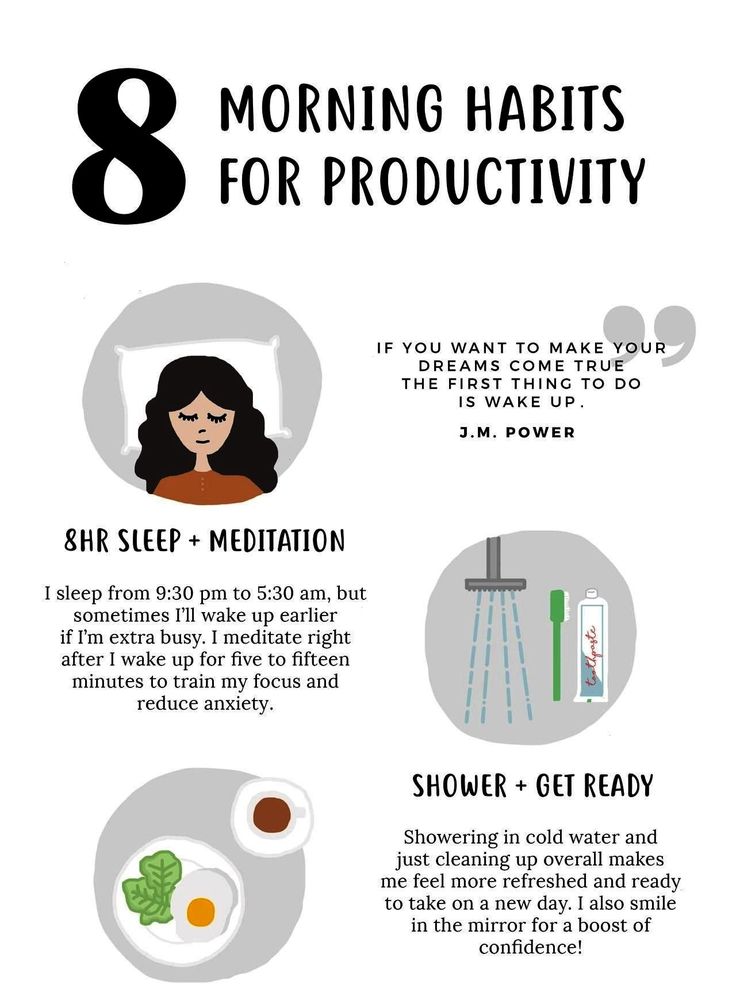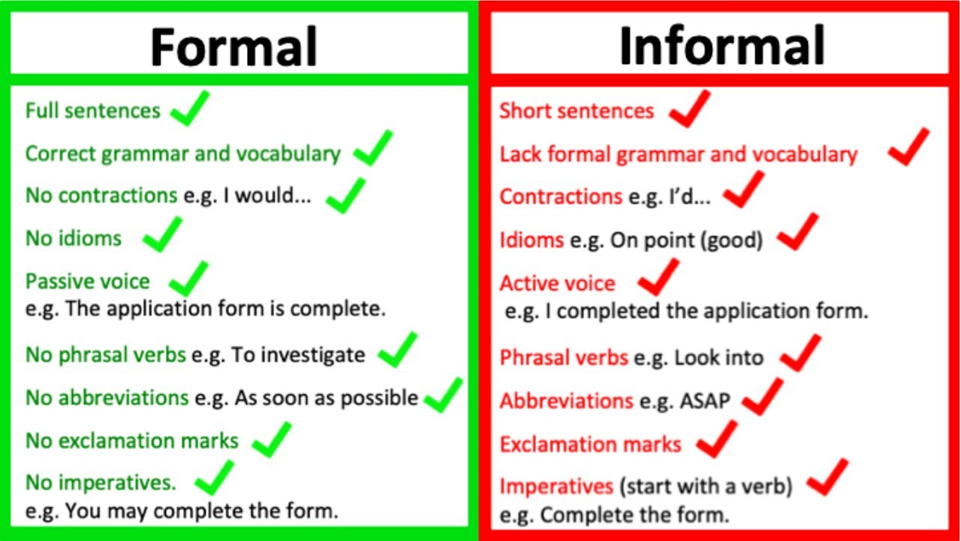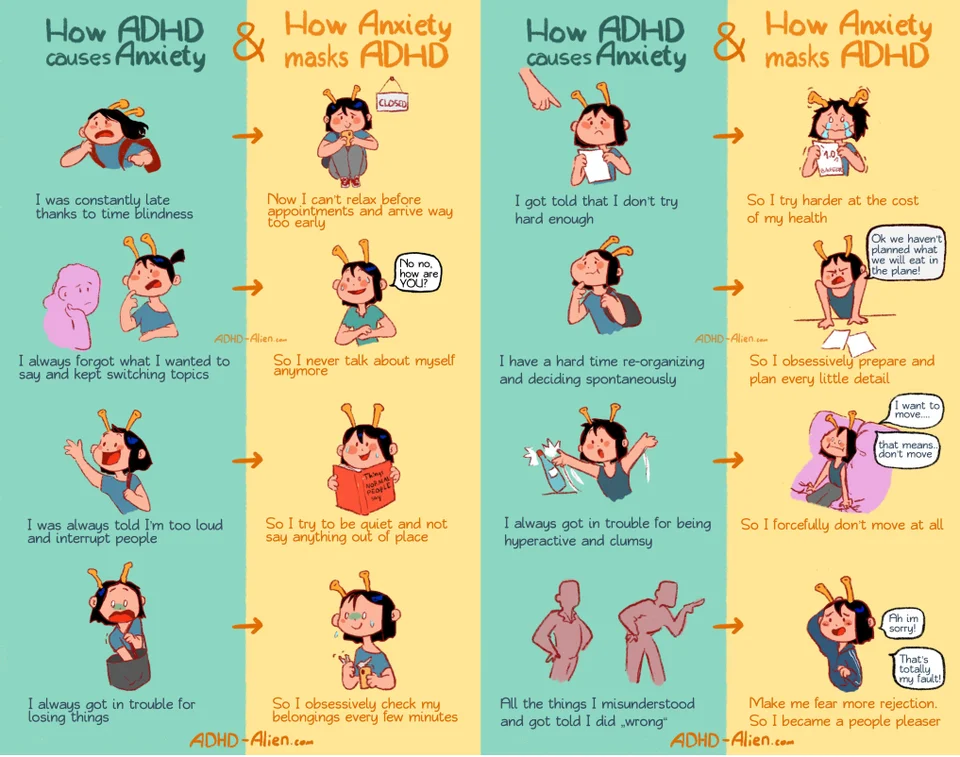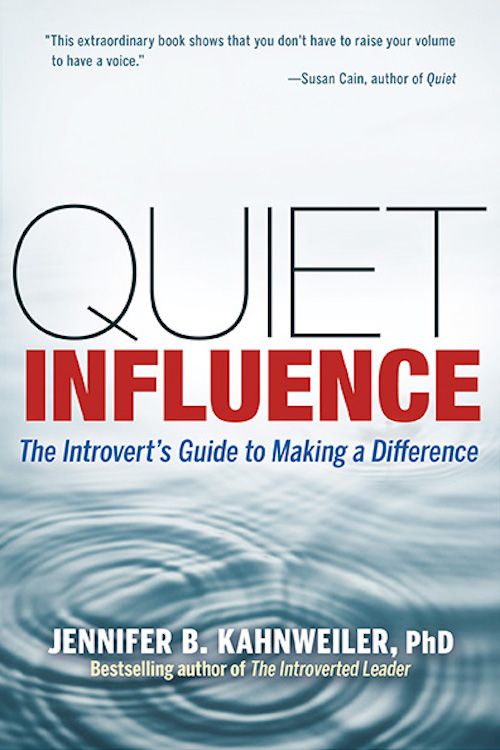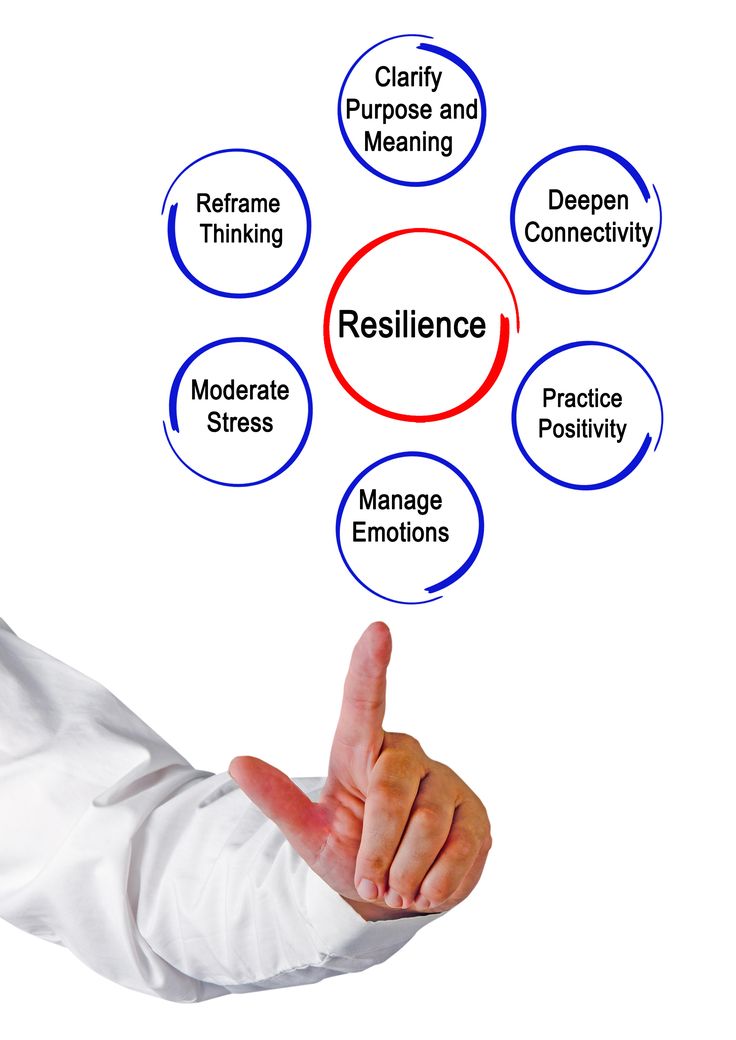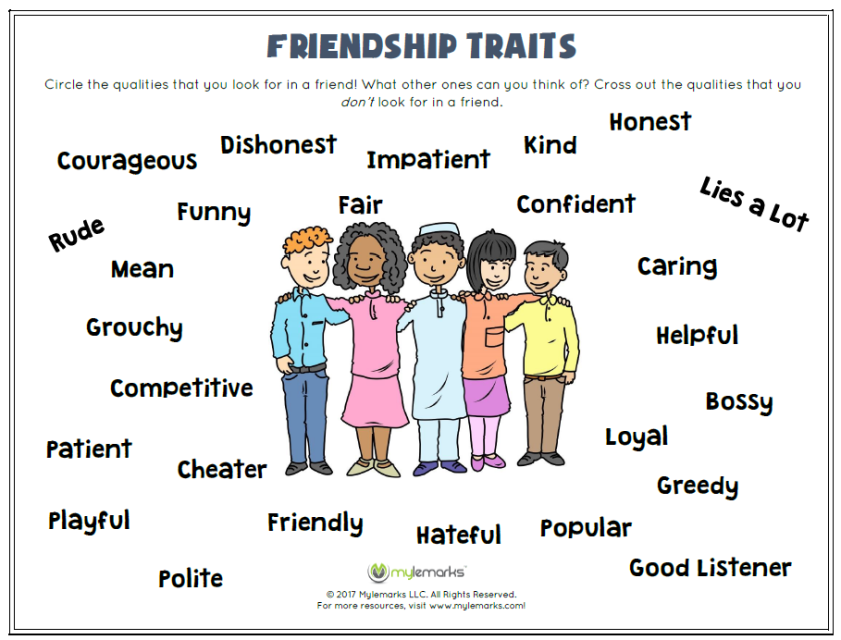How to feel more productive
How to be more productive: 10 productivity tips
Struggling to feel productive? Check out our top 10 tips and tricks on how to improve your productivity levels.
Share this post
Does it sometimes feel like you have a lot to do and very little time to do it? If you’re interested in how to be more productive, read on to discover valuable strategies to help you manage your time more effectively.
Table of Contents
What is productivity?
Productivity is a term often used in business settings, though it can actually apply to all areas of life. In a business context, productivity may be measured by the number of sales calls made or a factory line’s output. In an academic situation, productivity could be measured by the number of questions answered or words written.
In its most basic form, productivity is output measured by input. However, quantifying productivity isn’t always straightforward if the results aren’t immediately tangible. Some projects and industries require a lot of self-motivation. For example, in service provider industries, when trying to get a promotion or attempting a creative project such as writing a book. For these types of work, productivity can’t always be measured in terms of immediate results or output.
When considering how to be more productive, many turn to time management techniques. Although interconnected, productivity and time management are two different things and not all productive people are particularly good at time management.
Time management is a range of skills and tools that promote the effective use of a person’s time. Productivity is about the results that are achieved within a certain length of time. Sometimes the most productive results don’t come from effectively managing a list of tasks – productivity is more concerned with the outcome.
What is toxic productivity?
Toxic productivity is essentially the drive to be productive at all times, at the expense of all other pursuits. At its core, toxic productivity is simply a new term for ‘workaholic’ with a fresh modern spin.
At its core, toxic productivity is simply a new term for ‘workaholic’ with a fresh modern spin.
Some examples of this are the social media trends #girlboss and #ThatGirl, where young women are encouraged to ‘have it all’ by working and having a side hustle, whilst also finding time to work out, look their best at all times, fund multiple holidays a year, cook healthy meals and maintain an active social life.
Although these points may appear positive and aspirational, they also represent a toxic level of productivity coupled with the need to always achieve more. This can lead to long-term effects, impacting our ability to value ourselves beyond what we are “doing”.
During COVID-19 and the rise of remote working, the lines between home life and work/study became significantly more blurred. Even as people return to the office or places of study, a potentially unhealthy need to be constantly productive and to ‘go the extra mile’, has become something of its own epidemic.
But isn’t productivity a good thing? In times of high stress – like a pandemic – toxic productivity and the need to constantly be seen as busy only masks stress and anxiety. This can eventually lead to burnout. The University of Manchester discusses workplace stress and its adverse effects on productivity in their course: Workplace Wellbeing: Stress and Productivity at Work.
Luleå University of Technology
Workplace Wellbeing: How to Build Confidence and Manage Stress
Monash University
Mindfulness for Wellbeing and Peak Performance
ATC Training
Workplace Training: Training Evaluation and Measuring Effectiveness
How to be more productive at work
Although being productive is important in all aspects of life where outcomes are required or when people want to achieve goals, it is probably considered most important within the work environment.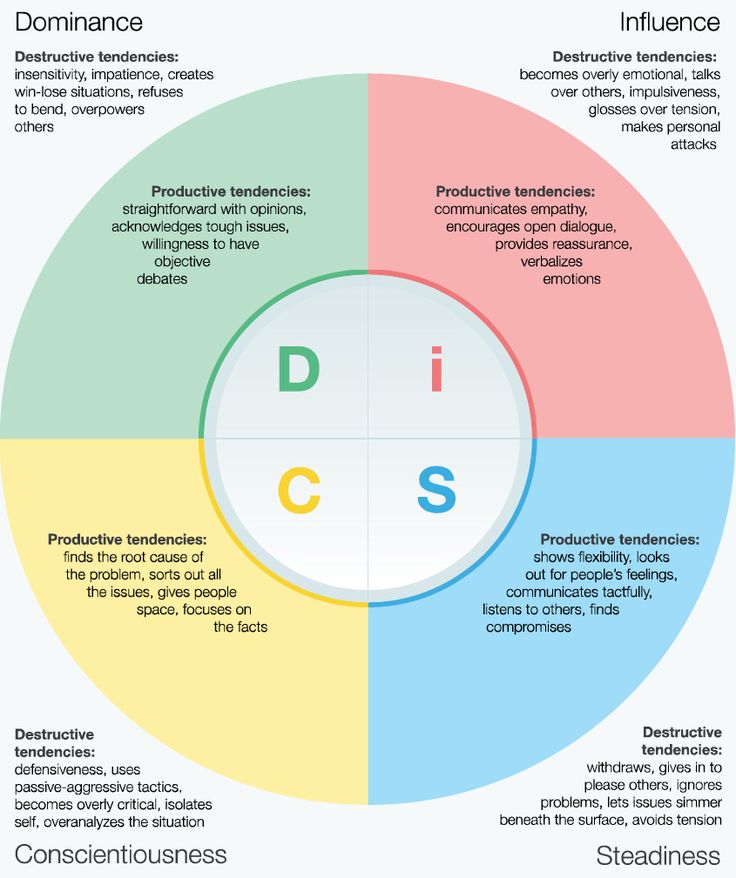
As the modern workplace has developed and shifted to combinations of in-person, remote, and hybrid over recent years, the traditional 9-5 has given way to more flexible ways of working. Some of these changes have encouraged people to work more effectively, but for others, these new dynamics present challenges in productivity, both for the employee and the employer, who must develop new ways of tracking efficiency and motivating their workforce.
Making some simple adjustments to your workday schedule creates possibilities to see an incremental boost in your productivity, whatever your industry. We’ve listed some of these adjustments below.
- Habit stacking – You can’t expect to transform all of your productivity habits overnight. Focus on making small, incremental changes to see what works – and what doesn’t.
- Time management – A series of skills focused on helping you make the most of your time. In order to be productive, time spent on activities must also generate results.
 Check out some time management strategies to see what can help you.
Check out some time management strategies to see what can help you. - Accountability – If you want to increase your work productivity, having someone holding you accountable can really help. Find a colleague who is interested in boosting their own productivity and hold weekly, mutual check-ins, or create a personal diary system to hold yourself accountable to regularly updated goals — keeping you on track.
If you’re interested in learning more about how we form habits or can change behaviour, check out UCL’s course on change intervention: Behaviour Change Interventions: Introductory Principles and Practice.
10 tips for improving productivity
Try incorporating some of these productivity tips into your daily schedule. Monitor what does and doesn’t work for you so you can build a lasting plan to improve your productivity.
1. Stop multitasking
It’s often tempting to try and multitask, juggling numerous workday tasks at any one time.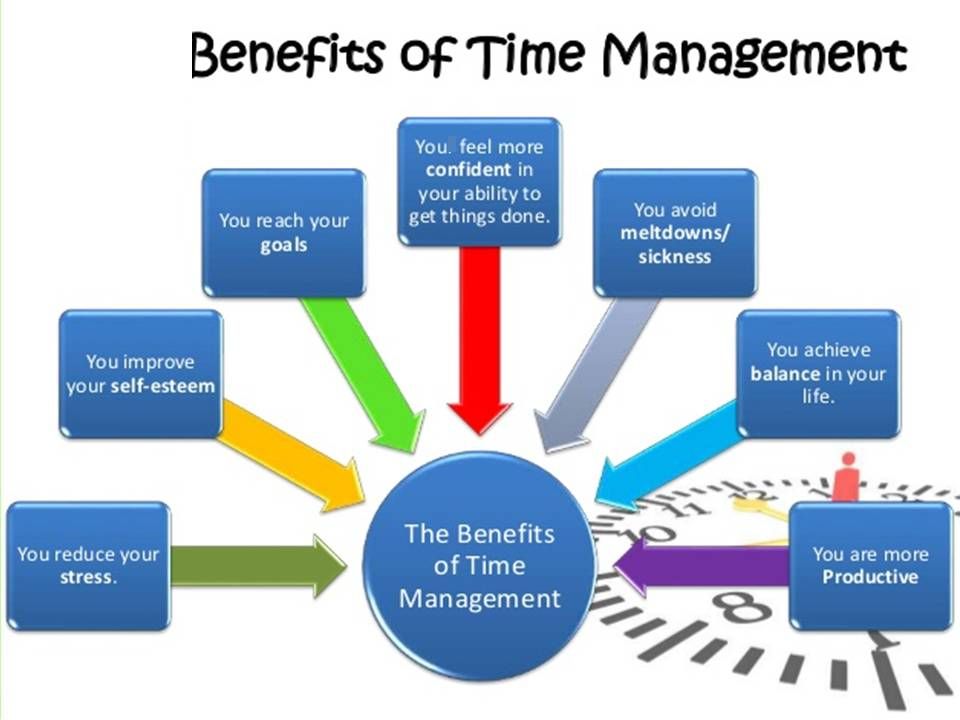 While this may feel productive, it rarely produces the best results. By focusing on just one task at a time, you will complete it to a higher standard and in less time, enabling you to move seamlessly on to the next task.
While this may feel productive, it rarely produces the best results. By focusing on just one task at a time, you will complete it to a higher standard and in less time, enabling you to move seamlessly on to the next task.
2. Set small goals
Large tasks or projects can feel intimidating and we often overestimate how long they will take to complete. You can create forward momentum by breaking tasks down into manageable, bite-sized milestones, which build until your project is complete. For example, clearing your inbox by answering four emails at a time throughout the day.
3. Take a break
It may seem strange to suggest taking breaks when talking about being productive at work, but regular breaks actually help decrease stress and increase productivity. Monash University’s course, Mindfulness for Wellbeing and Peak Performance, discusses how to improve performance by reducing stress in the workplace.
Many workplaces ensure employees take regular breaks. However, if you work from home or in an office that doesn’t monitor your activity, consider scheduling frequent short breaks of 10/15 minutes.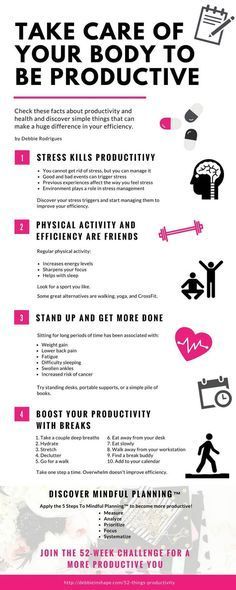 Use this time to step away from your work, enabling your mind to have a rest and return with renewed motivation and potentially new ideas.
Use this time to step away from your work, enabling your mind to have a rest and return with renewed motivation and potentially new ideas.
4. The five-minute rule
If procrastination is a big challenge for you, try the five-minute rule. By promising yourself that you will spend just five minutes on an outstanding task, you eliminate many of the excuses that stop you from starting. Almost anyone can dedicate just five minutes to writing an email, researching a topic, completing some filing or outlining a new task.
Often, once the five minutes are finished, the motivation to continue remains. Even if you move on to another productive task, the small jobs completed within the five minutes still represent an important contribution to your overall output. As ever, it is these small tasks that we put off the most.
5. Time blocking
Using time blocks is an established and well-known productivity strategy. By creating time block frames in your workday schedule, you make the conscious decision to dedicate a ‘block’ of time to a certain task.
Time blocks are usually divided into 60 or 90-minute sections. You may like to print the schedule out or colour code your tasks, as one of the benefits of time blocking is that once completed, it creates a visual guide for your workday.
Manchester Metropolitan University
Mental Skills Training for Sport and Health
University of Leeds
Skills to Succeed in the Digital Workplace
6.
 Delegate
DelegateIf you work as part of a team, look at your daily tasks and consider if any can be delegated to other team members. Often, we take on work that is outside our remit or can be done far quicker by others.
Delegation isn’t about offloading work you don’t want to do. Instead, it’s about ensuring everyone is working on the tasks best suited to their skills and availability. If you’re interested in learning more about managing and delegating within a team, the Open University’s course Business Fundamentals: Project Management explores this topic further.
Entrepreneurs tend to try and juggle all of their business tasks. Delegating to new employees or using freelancers for things like social media content can mean more time is available for higher priority tasks.
7. Limit distractions
Becoming distracted is very normal, and focus doesn’t always come naturally. However, it is a skill that can be developed. Turn your notifications off, switch your phone to aeroplane mode, or use a productivity app like Freedom.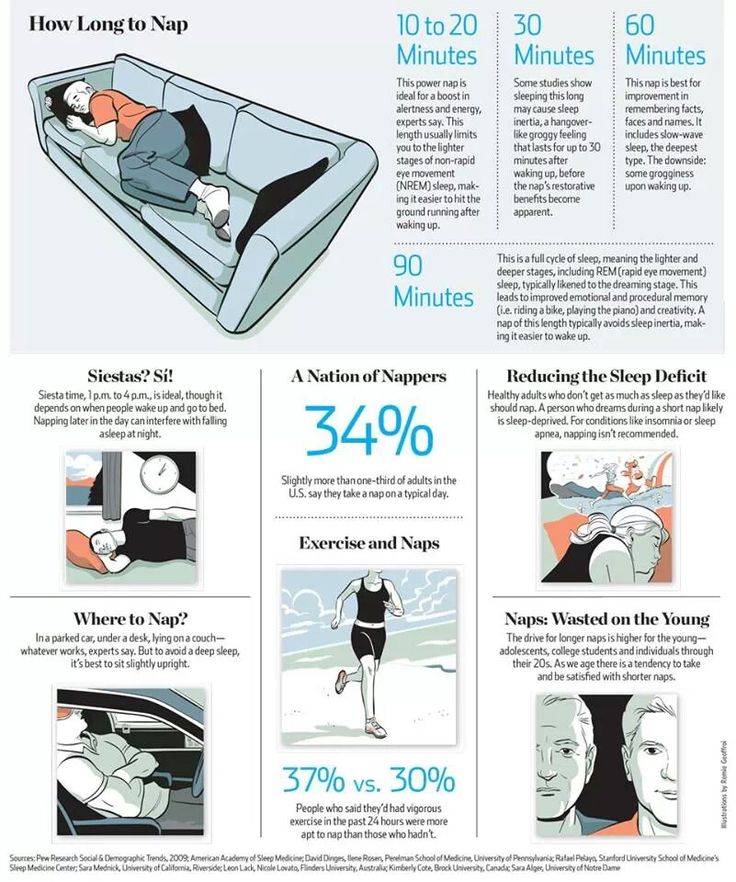
The Pomodoro technique is commonly used to prevent distractions and complete tasks. Users set a timer, removing all distractions from their vicinity (social media, emails, etc.) and work in timed sprints of 20-30 minutes. Knowing that you only have to focus for a short period is an excellent way of ability to focus for more extended periods.
8. Do the hardest thing first
It can be tempting to avoid difficult or time-consuming tasks and instead focus on quick wins. However, by taking on your most difficult projects first, you can increase your motivation and focus for the rest of the day. Consider prioritising these bigger tasks first in the day, or when you feel most productive.
9. Set boundaries
As we discussed in the section on delegation, employees often find themselves taking on work that is beyond the scope of their role. While it is considered a good thing to be flexible and take opportunities for career development, it is also important to set boundaries on your time.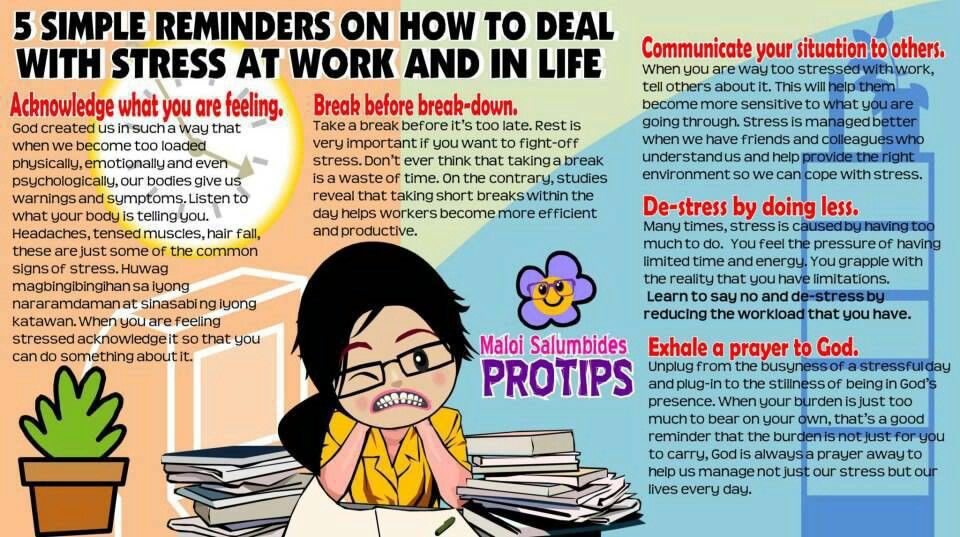
To complete your tasks effectively and be productive, you must be able to complete them within a reasonable timeframe. Setting boundaries stop you from becoming overwhelmed. If you are interested in learning more about resilience at work and maintaining boundaries, look into Deakin University’s course Professional Resilience: Building Skills to Thrive at Work.
10. Identify when you’re most productive
With the advent of covid and remote working, the traditional 9-5 is becoming increasingly less common. Flexible and hybrid working has promoted the concept of working in more productive ways. Everyone is individual. Some employees work best in the morning, while others hit their productive stride after lunch. Identifying when you are most productive and then organising your daily schedule to make the most of these peak times is an excellent way to increase productivity.
Final thoughts
We have discussed some of the key aspects of increasing productivity both in the workplace and in our day to day lives. Focusing on trying one of two of these productivity tips at a time makes it possible for anyone to develop skills in this area, reducing stress and maximising our professional and personal goals.
Focusing on trying one of two of these productivity tips at a time makes it possible for anyone to develop skills in this area, reducing stress and maximising our professional and personal goals.
UCL (University College London)
Behaviour Change Interventions: Introductory Principles and Practice
Deakin University
Professional Resilience: Building Skills to Thrive at Work
Monash University
Maintaining a Mindful Life
What Efficient People Have in Common
Table Of Contents
- The habits of highly productive people
- How to be more productive
- Quick tips on how to be more productive
We’ve all known that person who always seems to be getting things done.
Whether a friend or a colleague, this is the person whose work is always done early. The one who somehow manages to finish hour-long tasks in 20 minutes.
The one people describe as a robot or machine, because surely no simple human could work as quickly as they do.
And yet these people exist, cranking away at maximum efficiency. What do these highly productive people have in common? How do they do it?
The habits of highly productive people
It’s tempting to look at highly productive people as machines (or wizards). But by studying how they work efficiently and overcome the challenges we all experience, it’s possible to boost your own productivity as well.
How do the most efficient people overcome challenges like:
- Procrastinating on tasks—both small, nagging ones and large, challenging ones
- Boring work that needs just to get done
- Responding to email and other messages while working
- Staying motivated and energized throughout the entire work day
- Focusing and finishing the most important projects on their plates
As much as I would like to claim the status of “highly productive person,” the best I can do is say: I’m working on it.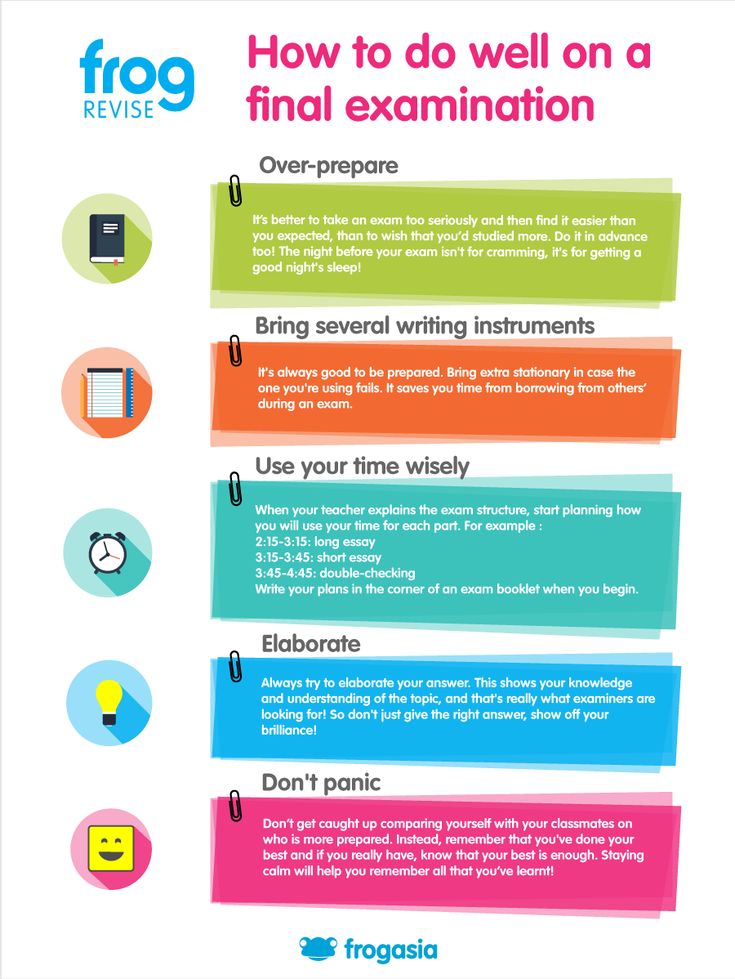 But from reading articles, checking out books, and asking questions of productive people, I’ve pulled together the best advice I could find on their productivity habits.
But from reading articles, checking out books, and asking questions of productive people, I’ve pulled together the best advice I could find on their productivity habits.
What follows are 18 of the most important habits of highly productive people. From ways to spend less time on emails to methods of staying focused, these productivity tips can help you maximize your efficiency — and get more done.
You can’t become more productive overnight. But if you make small changes and put some of these habits into place, you’ll be well on your way to becoming more efficient.
How to be more productive
Increase productivity and become highly efficient with these habits:
- Focus on most important tasks first
- Cultivate deep work
- Keep a distraction list to stay focused
- Use the Eisenhower Matrix to identify long-term priorities
- Use the 80/20 rule
- Break tasks into smaller pieces
- Take breaks
- Make fewer decisions
- Eliminate inefficient communication
- Find repeatable shortcuts
- Learn from successes as well as mistakes
- Plan for when things go wrong
- Work before you get motivated or inspired
- Don’t multitask
- Fill the tank — recharge
- Sharpen the axe
- Manage your energy (not just time)
- Get better at saying “no”
Get more productive with automation
Get a free 14-day trial of ActiveCampaign.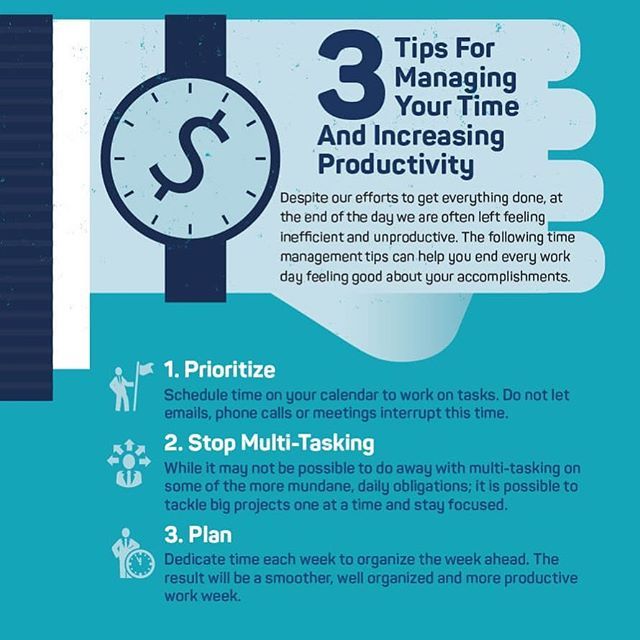 Let marketing automation handle the boring stuff (no credit card required).
Let marketing automation handle the boring stuff (no credit card required).
1. Focus on most important tasks (MITs) first
Productivity tip – Focus on most important tasks (MITs) first Tweet this!
You probably didn’t go to the Massachusetts Institute of Technology — but an MIT can help you be more productive.
The theory behind Most Important Tasks is that any given to-do list has some tasks that are more important than others. If you focus on simply checking off to-do list items, you’ll end up with a mix of important and less important tasks completed.
It also exposes you to the potential for procrastination — it’s easy to spend the whole day checking off easy, less important to-dos instead of buckling down on the hard stuff.
Instead, spend a few minutes at the beginning of your day to choose 1–3 MITs — the things that, no matter what, you need to finish by the end of the day.
With a renewed focus on what’s important, it’s easier to create a meaningful to-do list — make sure the important things get done.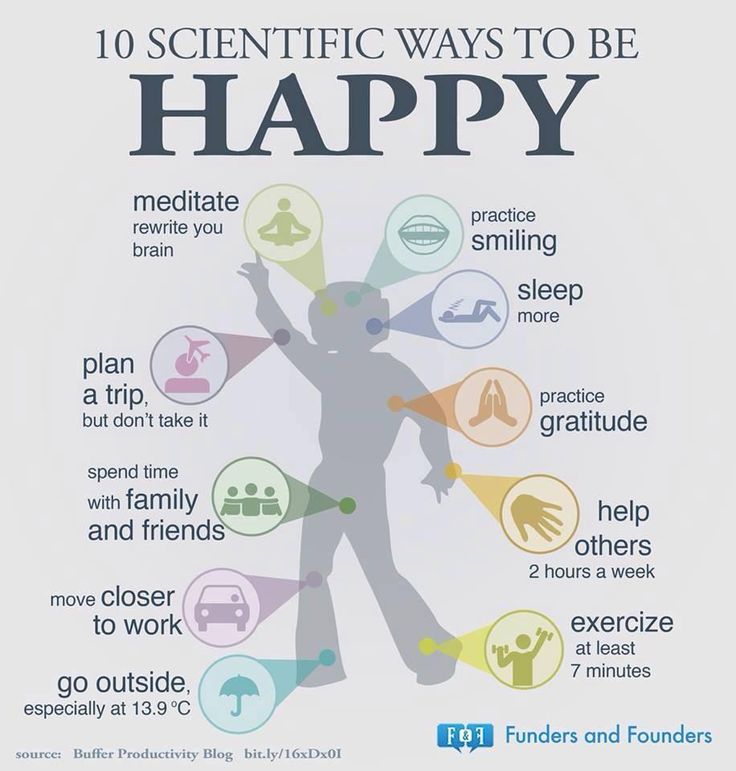
Laura Earnest of Whole Life Productivity had this to say on the importance of prioritization as a productivity habit:
“Let me say that I distinguish between efficient and effective, but that both are needed for peak productivity. Efficient is doing things right and effective is doing the right things. So the most productive people work on the high value tasks, making sure that how they are doing those tasks is the best way.
I also believe that the most productive people are able to discern which are the high value tasks, and are able to either let the others go or delegate them. It’s not a crazy rush to get everything done, because they recognize that they can’t get everything done.”
2. Cultivate deep work
Productivity tip – cultivate deep work (even if it means saying no more often) Tweet this!
Some tasks are just hard. There’s no substitute for deep work.
Everybody has a few daily to-dos that could be almost be knocked out while sleeping.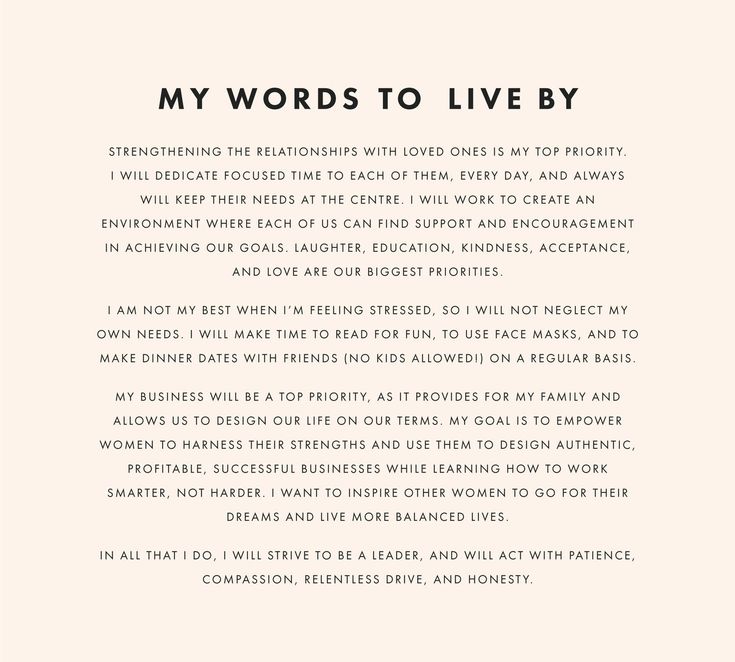 These are the tasks that you need podcasts to get through — if anything, they’re hard to get yourself to do because they’re not especially interesting.
These are the tasks that you need podcasts to get through — if anything, they’re hard to get yourself to do because they’re not especially interesting.
At the same time, some tasks are just difficult. You can’t multitask your way to finishing them. You need to devote serious time and mental effort to knocking them out of the park. These tasks are called “deep work.”
Cal Newport wrote about this type of work in his bestselling book, Deep Work: Rules for Focused Success in a Distracted World. Newport argues that the skill of intense focus is increasingly rare—and that those who can master it are at an enormous advantage.
A few of Newport’s recommendations to cultivate deep work are:
- Schedule deep work: Plan deep work into your schedule at a similar time every day, probably in the morning. Having a regular time to do deep work helps you make it a habit.
- Get bored: It sounds counterintuitive to call being bored a productive habit, but being comfortable with boredom is important.
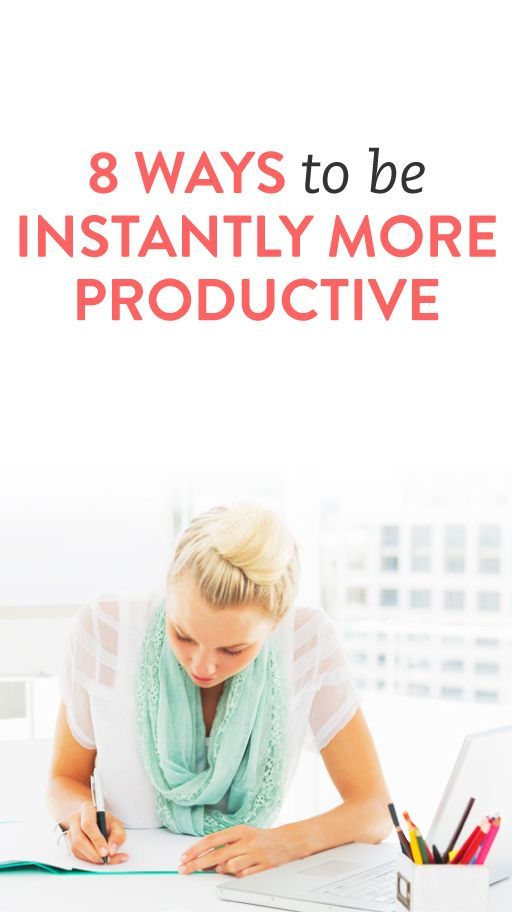 Deep work isn’t always enjoyable, and boredom or frustration are what cause us to seek out distractions. Avoid using social media for entertainment as much as possible, and get more comfortable doing nothing.
Deep work isn’t always enjoyable, and boredom or frustration are what cause us to seek out distractions. Avoid using social media for entertainment as much as possible, and get more comfortable doing nothing. - Be harder to contact: Email and other distractions can be reduced by asking people who contact you to do more work up front. Ask people to research their questions before coming to you, and provide as much info as possible in their emails. Same goes for you—spending time on communications instead of dashing off a quick email can minimize back and forth.
- Know your work habits: Do you work best in isolation? With periodic breaks? Are you working around a hectic schedule? You don’t need to overhaul your entire schedule—just set aside some time for deep work.
Highly productive people have mastered the skill of deep work.
3. Keep a distraction list to stay focused
Productivity tip – keep a distraction list, to jot down ideas you think of while you're working Tweet this!
With emails, social media, and a thousand little to-dos, it’s easy to get distracted when you’re trying to be productive.
Whether you’re trying to focus on deep work or just dealing with smaller tasks, distractions are the bane of productivity. It’s hard to maintain efficient work habits with distractions around.
One powerful method of reducing distractions is creating a “distraction list.”
Keep this list — whether it’s a Google Doc or a physical piece of paper — nearby while you’re working. Whenever a distracting thought pops up, write it down on the list and get back to work.
This technique, which is one of the secrets to the Pomodoro Technique, is powerful because a lot of the time your distractions legitimately require attention.
If I’m doing deep work and suddenly remember a bill that needs to be paid, or have an idea for a new blog post, those are thoughts that deserve attention.
They just don’t deserve it right now.
As thoughts arise during your work, jot them down. Once you reach a break in your work, you can come back and either tackle them or add them to your larger to-do list.
4. Use the Eisenhower Matrix to identify long-term priorities
Productivity tip – use the Eisenhower Matrix to find your important but not urgent tasks Tweet this!
One of the dangers of productivity is a focus on the short term. As management legend Peter Drucker once said, “there is nothing so useless as doing efficiently that which should not be done at all.” When you study productivity habits, it’s easy to fall into that trap.
On any given work day, it’s easy to get caught up in things that seem important right now.
The Eisenhower Matrix, used by Dwight Eisenhower to make decisions during his time as a general, was popularized by Stephen Covey’s book The 7 Habits of Highly Effective People. It helps you to quickly determine what you should work on and what you should ignore.
To create an Eisenhower Matrix, make a 2 x 2 square. On one axis, write “important” and “not important.” On the other, “urgent” and “not urgent.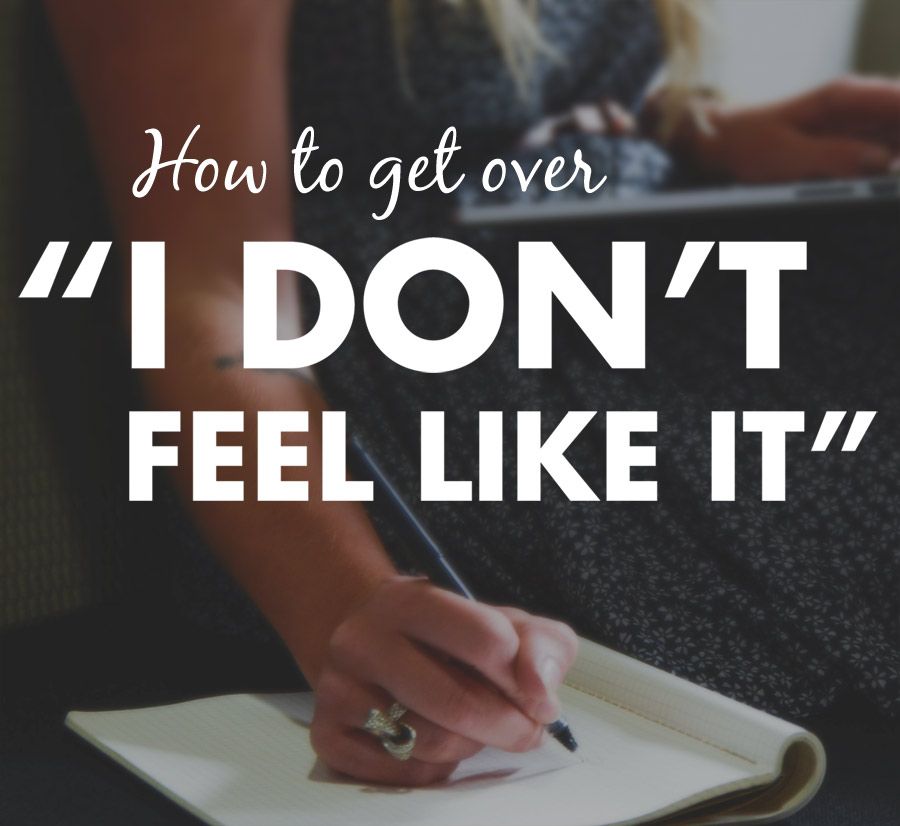 ”
”
Source: Develop Good Habits
Organizing your to-do list based on each task’s importance and urgency can help you identify time-sinks that aren’t worth it.
Are you spending most of your day doing things that are urgent but not important? Look for ways to delegate, automate, or eliminate.
Are you spending time on things that aren’t important or urgent? Ignore those things.
Are you making time to work on things that are important but not urgent? If you’re like most people, you could be spending more time in this quadrant. The Eisenhower Matrix makes it easier to see what matters and what doesn’t.
5. Use the 80/20 rule
Productivity tip – use the 80/20 rule to focus your time on the most impactful tasks Tweet this!
Another way to prioritize tasks comes from the 80/20 principle.
Discovered by Italian economist Vilfredo Pareto, the 80/20 rule (also called the Pareto Principle) states that, in any pursuit, 80% of the results will come from 20% of the efforts.
To maximize efficiency, highly productive people identify the most important 20% of their work. Then, they look at ways to cut down the other 80% of their schedule, to find more time for the things that make the biggest impact.
This email is part of the 20%
Put in your email address. Once a week, we'll send you our best marketing advice (the stuff that gets 80% of results).
6. Break tasks into smaller pieces
Productivity tip – break down tasks into a single next step. It will stop procrastination. Tweet this!
Why do you procrastinate?
There are a variety of reasons that people procrastinate, but one of the most important is that the tasks on their to-do list just seem too daunting.
If you have to-do list items that are large in scope and not very specific, tackling those tasks becomes challenging. You look at the item and think “I don’t even know where to start.”
You can start by breaking large to-dos into smaller to-dos. Set small goals for each task.
Set small goals for each task.
If I have a to-do list item labeled “write a blog post on productivity,” it’s easy to (ironically) put it off — because there are a few different places I could start.
What if I broke that larger task into smaller chunks? Instead of “write a blog about productivity,” an example of my to-do list could be:
- Look up keywords related to productivity and good, efficient habits
- Read the top 10 Google results on productivity
- Brainstorm other methods to become more productive
- Organize the ideas I’ve found or thought of into an outline
- Jot down any specific thoughts on each tactic using bullet points
- Go through my bullet points one at a time, to flesh them out into full sections
My larger to-do item has become six smaller tasks. Sure, that makes my to-do list longer, but it also helps me get things done faster — and I don’t have to think about where to start.
Each item on my list is incredibly specific.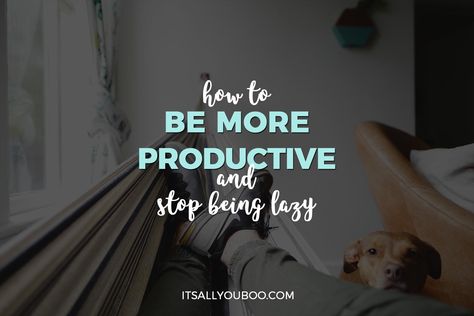 All I have to do is tackle them in order. The result is the blog post you’re reading right now.
All I have to do is tackle them in order. The result is the blog post you’re reading right now.
7. Take breaks
Productivity tip – taking breaks makes you more productive. A short break every 55 minutes is ideal. Tweet this!
Nobody, not even highly productive people, can focus for eight hours straight. It simply isn’t possible. No matter how many efficient habits you build, you can’t maintain distraction-free focus for that long.
That’s why taking breaks is so important (and research shows it makes people more productive). Even breaks that are just a few minutes long can help you recharge and come up with new ideas.
Be proactive about taking breaks. When you take breaks, it’s important to make them structured and deliberate. It’s easy to justify distractions as “taking a break.” But if you don’t have that break time scheduled, it’s possible that you’re actually just getting distracted.
Methods like the Pomodoro Technique can help. The Pomodoro Technique suggests 25 minute blocks of work, with short 5 minute breaks. You work intensely for a specific amount of time, followed by intentionally not working for a shorter amount of time.
The Pomodoro Technique suggests 25 minute blocks of work, with short 5 minute breaks. You work intensely for a specific amount of time, followed by intentionally not working for a shorter amount of time.
Scheduling breaks can keep you fresh and productive throughout an entire day.
8. Make fewer decisions (about things that aren’t important)
Productivity tip – make fewer decisions. Try to automate decisions, or make less important decisions without too much thought Tweet this!
While he was President, Barack Obama once told Vanity Fair that he never makes a decision about what to wear:
“You’ll see I wear only gray or blue suits,” [Obama] said. “I’m trying to pare down decisions. I don’t want to make decisions about what I’m eating or wearing. Because I have too many other decisions to make.”
Some decisions are important. Most aren’t. If you want to be more productive, consider outsourcing or eliminating everyday decisions.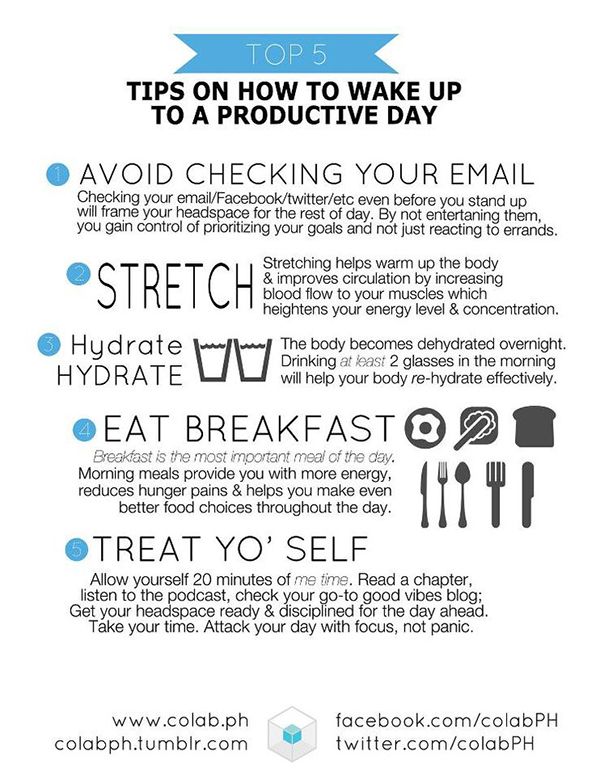
Other highly productive people have made similar comments about their own efficient habits. Author and entrepreneur Ramit Sethi has what he calls “Ramit’s Book Buying Rule:”
“If you’re thinking about buying a book, just buy it. Don’t waste five seconds debating it. Even one idea makes it more than worth the price.”
If you’re trying to decide between two books to read, Sethi would say: “read them both.” There’s no point on wasting your decision-making energy on the unimportant.
9. Eliminate inefficient communication (spend less time on email)
Productivity tip – spend less time on email by putting more information in your emails (cut down back-and-forth) Tweet this!
It’s time we got to the elephant in the room: email.
Email is often considered the bane of productivity habits. Many people spend their work day with their email inbox clearly visible, responding to every notification as it comes in.
As I said in the deep work section, there’s a lot of value in reducing these kinds of distraction. One way to do that is simply by minimizing your inbox and checking at specific intervals.
Another is to become more efficient in your email communications to begin with. In other words: Send better emails.
Have you ever tried to schedule a meeting, then sent another five emails back and forth to set a specific time and place?
What if you could reduce the number of emails it takes to schedule simple meetings? Or make each email more precise, so that there’s less back and forth before your actually get to the real work?
Highly productive people reduce the number of emails they send by making each email clearer and more valuable. That might mean each email takes a few more minutes to write — but it also ultimately saves time.
If you need to schedule a meeting with an employee, don’t just sent them an email like this:
“Hi [employee name],
I wanted to meet so we could talk about [project]. When is a good time for you?
When is a good time for you?
Best,
[your name]”
An email like that gets the job done, but it’s going to lead to a lot of additional scheduling emails.
Your actual meeting is also going to wind up being pretty inefficient, as you’ll need to go through the agenda in person — and the other person won’t have time to think through answers to your questions.
A better email might look like this.
“Hi [employee name],
I wanted to meet so we could talk about [project]. I specifically wanted to talk about:
[Project agenda topic 1]
[Project agenda topic 2]
[Project agenda topic 3]
I took a look at your calendar, and it seems like we’re both free on Tuesday at 10am or Wednesday at 1pm. Let me know what works best for you, and feel free to book my calendar.
Best,
[your name]”
This email is a little longer. It takes a little bit more thought to write. But it’s also much more efficient. It will take between 0 and 2 more emails to set up this meeting, and you’ll go in with a clear agenda and objectives.
But it’s also much more efficient. It will take between 0 and 2 more emails to set up this meeting, and you’ll go in with a clear agenda and objectives.
You can use a third-party scheduler like Calendly to make this even easier. Just send someone your link and they can book a time that works for both of you.
From scheduling meetings to giving out assignments or asking questions, make your emails as precise as possible. This takes a little bit more work up front, but ultimately makes you more efficient and cuts down on unnecessary work.
10. Find repeatable shortcuts — automate tasks
Productivity tip – what do you do over and over? Look for tech that can automate those tasks Tweet this!
If you find yourself doing the same things over and over, look for ways to do those things faster.
This can be as simple as learning common keyboard shortcuts, or involve automating entire sections of your business.
What are some ways you can find shortcuts? Here are a few potential examples:
- Put together standard operating procedures for common tasks, so you can quickly follow checklists instead of working from scratch
- Delegate tasks to interns or other employees where appropriate.
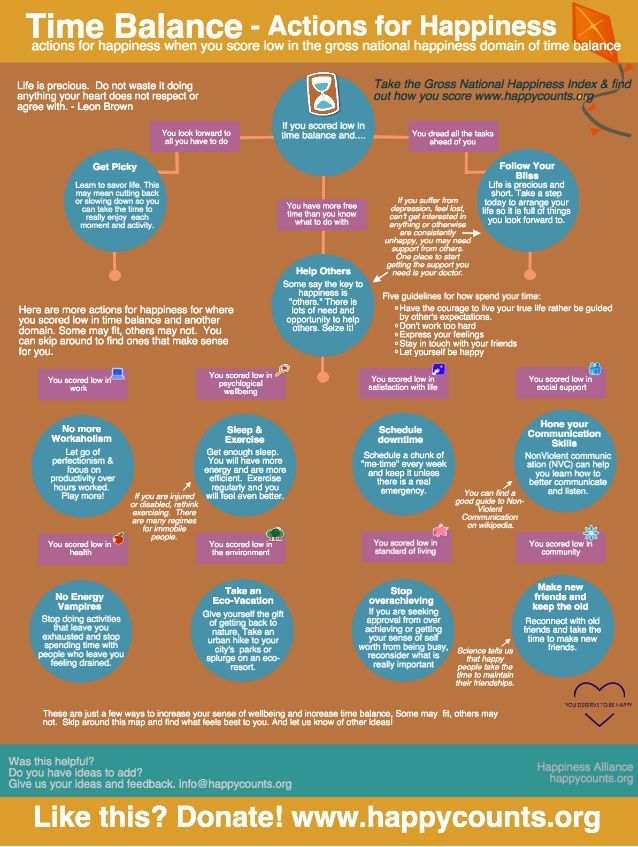 (Just make sure you follow up with and update your team regularly.)
(Just make sure you follow up with and update your team regularly.) - Learn simple keyboard shortcuts that come up often. I like using “command + shift + t” to open a recently closed tab, or “command + option + 2” to create a heading in Google docs.
- Increase your typing speed — it seems obvious, but the difference between 60 and 90 words per minutes is huge. A game like Typeracer can help (warning: it’s addictive).
- Use technology to take care of repetitive tasks
Repetitive tasks are great candidates for shortcuts, delegation, or automation. Knocking them off your schedule can save you lots of time and energy.
11. Learn from successes as well as mistakes
Productivity tip – learn from your successes, not just your mistakes. Make efficient processes more efficient. Tweet this!
One of the challenges of highly productive people is ensuring that fast work is also good work.
When you’re working quickly, you open yourself up to making mistakes.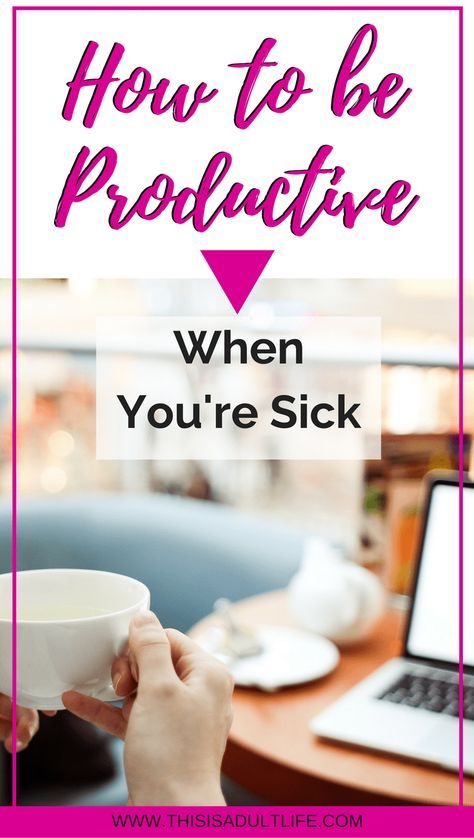 Highly productive people tackle that risk by learning and improving at every possible moment — so that producing good work becomes intuitive.
Highly productive people tackle that risk by learning and improving at every possible moment — so that producing good work becomes intuitive.
Learning from mistakes is obvious (although of course valuable). When something goes wrong, analyzing the mistakes and looking for ways to prevent them is a massively valuable learning experience.
As important, and much less common, is learning from successes. When something goes well, why?
When you have a success, it can be tempting to pop the champagne and start celebrating. And don’t get me wrong — it’s good to celebrate your successes.
But successes deserve every bit as much scrutiny as failures.
Highly productive people make the most of successes by figuring out how to repeat them. What went well and why? What should you take from this experience and use again? Are there elements of a successful project that weren’t as effective and can be eliminated?
Asking these questions helps you go from one success to repeated successes.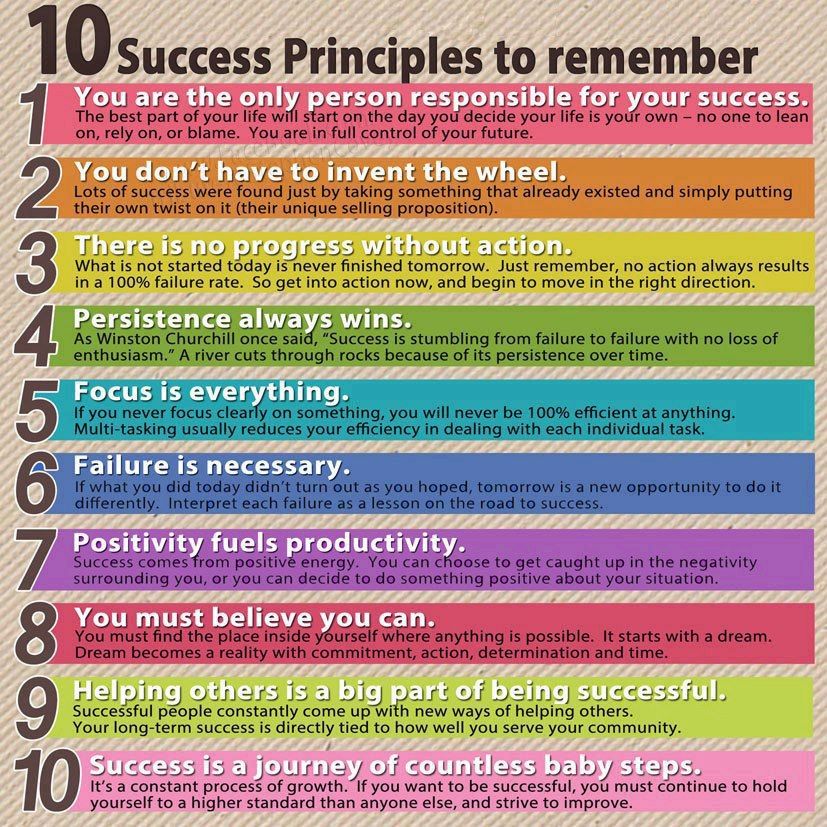 It also helps you understand your successes on a more intuitive level — which saves you time whenever you sit down to work on a new project.
It also helps you understand your successes on a more intuitive level — which saves you time whenever you sit down to work on a new project.
12. Plan for when things go wrong
Productivity tip – make an if/then plan for when things go wrong (before they ever go wrong) Tweet this!
It happens to everyone. You have big plans for today — it’s going to be your most productive day yet — but then little fires start popping up and demanding your attention.
Whether your furnace breaks and you need to call a repairman, a last minute meeting pops up, or you forgot to schedule in time for lunch — sometimes things go wrong.
Highly productive people acknowledge the planning fallacy: The fact that everyone underestimates how long it will take to finish tasks.
Research on the planning fallacy shows that a lot of the reason for this misestimation is that we forget to take into account tasks or responsibilities that aren’t yet on our calendars.
Have you ever tried to schedule a meeting and thought “let’s do this next week, next week looks more open?” But then next week comes around and it’s just as busy as always.
Highly productive people are better at realizing that next week only seems open because you haven’t scheduled it yet. By planning for interruptions and creating contingency plans, highly productive people can adapt quickly when unplanned problems present themselves.
13. Work before you get motivated or inspired
Productivity tip – motivation comes AFTER productivity (not before). Start by working to get inspired. Tweet this!
A lot of people looking to get more productive habits talk about needing to get inspired or motivated. Highly productive people instead focus on getting started — whether they’re motivated or not.
In her classic book Bird by Bird, author Anne Lamott gives this advice to aspiring writers: look through a one-inch picture frame.
What does that mean?
It means that you don’t need to tackle everything at once. When you are having trouble getting motivated, it’s often because you are looking at the massive scope of a project.
That’s intimidating. It’s hard to get started when faced with the enormity of a task.
Lamott tells writers not to worry about inspiration or motivation. Just start writing in the smallest possible way. Even if you need to start by describing your own shoes, getting words — any words — on the page is the first step.
The same applies to your work — even if you’re not a writer.
If you feel overwhelmed or find yourself procrastinating, look through a one-inch picture frame. Start doing something — like breaking the task into smaller chunks — and you’ll find it easier to keep going.
Taking action is what leads to motivation, which in turn leads to more action. Highly productive people don’t wait for motivation — they start working and the motivation follows.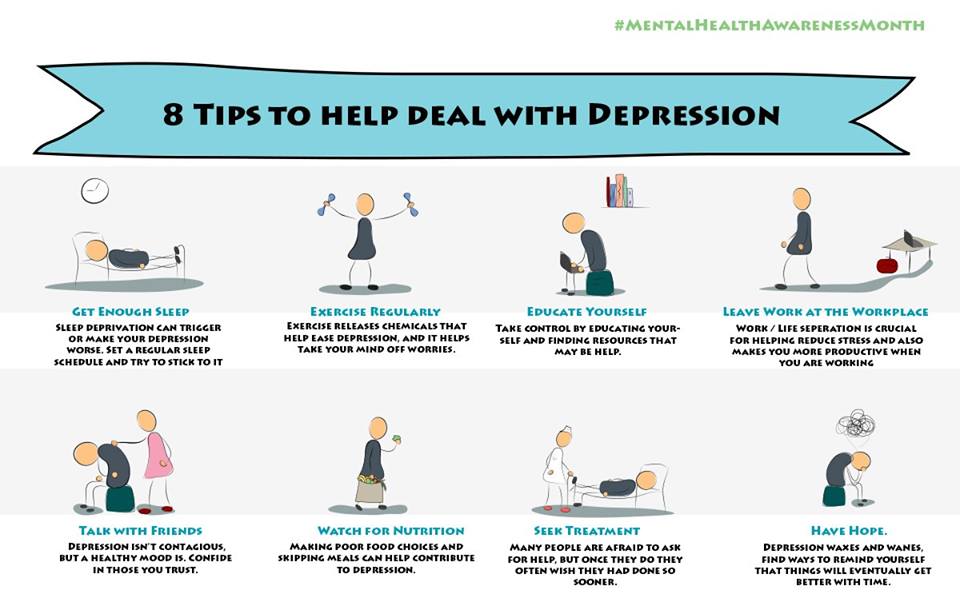
14. Don’t multitask
Productivity tip – Don't multitask. Checking email or social media counts as multitasking. Tweet this!
With so many distractions in our surroundings, it’s tempting to fall into the trap of multitasking.
Don’t.
The research on multitasking is clear: people are bad at it.
The reason is that “multitasking” is actually misnamed. When you try to multitask, you aren’t really doing two things at once — you’re rapidly switching your focus between two things.
Every time you switch, you have to re-focus on the new task. Because it takes a few minutes to get up to speed on a task, these “switching costs” make multitasking extremely inefficient.
Are there times where multitasking is ok? Probably.
If you’re cleaning your apartment while listening to an audiobook, you’re probably going to do just fine. The reason is that the two tasks — cleaning and listening — don’t use the same mental resources.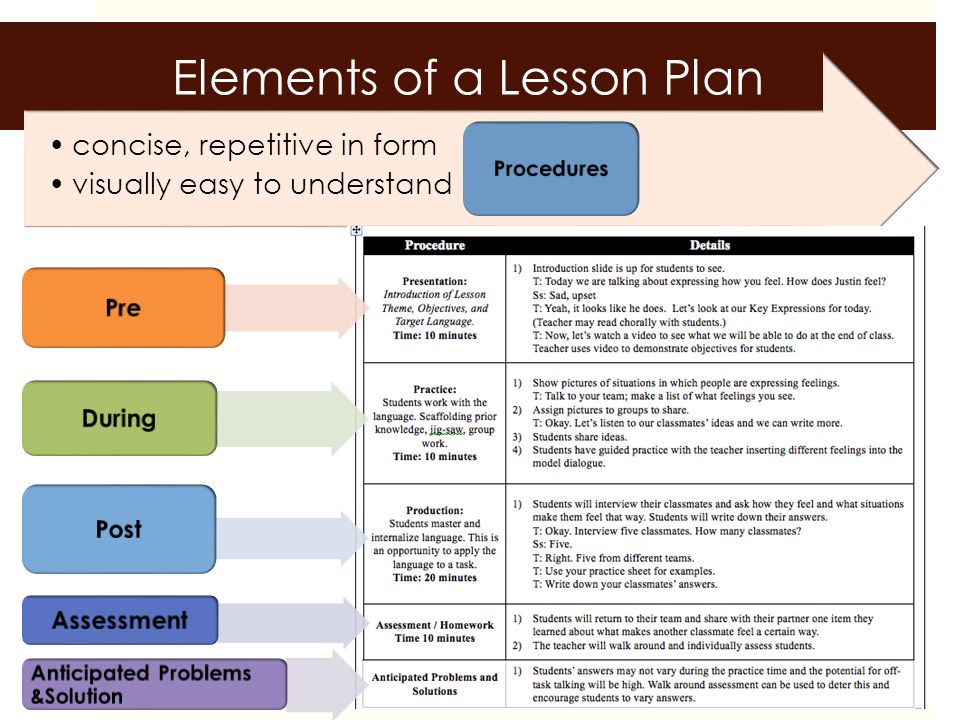
But if you’re writing an email while trying to follow the words in a podcast, both tasks are competing for your language resources — your work will slow down and quality will suffer. It also zaps your energy and makes your brain more tired, which means that you slow yourself down on future tasks, too.
But how do you stop multitasking?
Avoiding multitasking can be as simple as closing the tab with your email and muting Slack, email, or text notifications. In most jobs, waiting an extra half hour to respond to an email won’t be the end of the world.
Eliminating multitasking is one of the most productive habits you can develop.
15. Fill the tank — recharge
Productivity tip – your energy is as important as your time for productivity. Recharge Tweet this!
Productivity tactics, email templates, project management software, and prioritization are valuable methods of improving your productivity.
But they won’t help if you aren’t taking care of yourself.
Highly productive people spend time recharging. That means getting enough sleep every night, exercising, and eating healthy.
If you aren’t thinking straight or have trouble focusing, take a look at your personal habits. I know that 7 or 8 hours of sleep just isn’t enough for me — I really need closer to 9, and missing out on sleep affects my productivity for days.
Sleep. Exercise. Eat well. Get outside and soak up some sunshine. Taking care of your healthy habits is a crucial part of efficient work habits.
16. Sharpen the axe
Productivity tip – time spent getting better at tasks saves time on those tasks in the future (sharpen the axe) Tweet this!
There’s a famous quote attributed to Abraham Lincoln that goes:
“Give me six hours to chop down a tree and I will spend the first four sharpening the axe.”
Whether Lincoln actually said this or not is debated, but the lesson behind it is important: If you want to be productive, you need to make sure you stay sharp.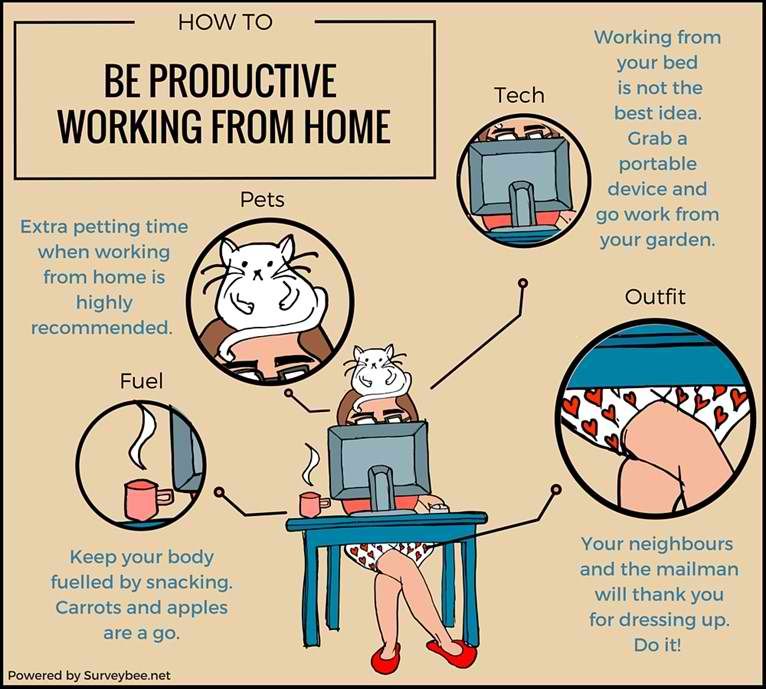
In a modern example, Warren Buffett and Charlie Munger attribute much of their success to reading.
By spending a lot of time reading, becoming more knowledgeable, and getting better at their trade, they were able to make faster and more accurate decisions.
As Munger once said:
“Neither Warren nor I is smart enough to make the decisions with no time to think. We make actual decisions very rapidly, but that’s because we’ve spent so much time preparing ourselves by quietly sitting and reading and thinking.”
Dedicate time to improving, and you’ll be able to respond more efficiently to a variety of situations.
17. Manage your energy (not just time)
Productivity tip – manage your energy, not just your time Tweet this!
Time management is a huge part of productivity. Many of the productivity habits on this list will help you manage your time more effectively.
But just as important — and often overlooked — is energy management.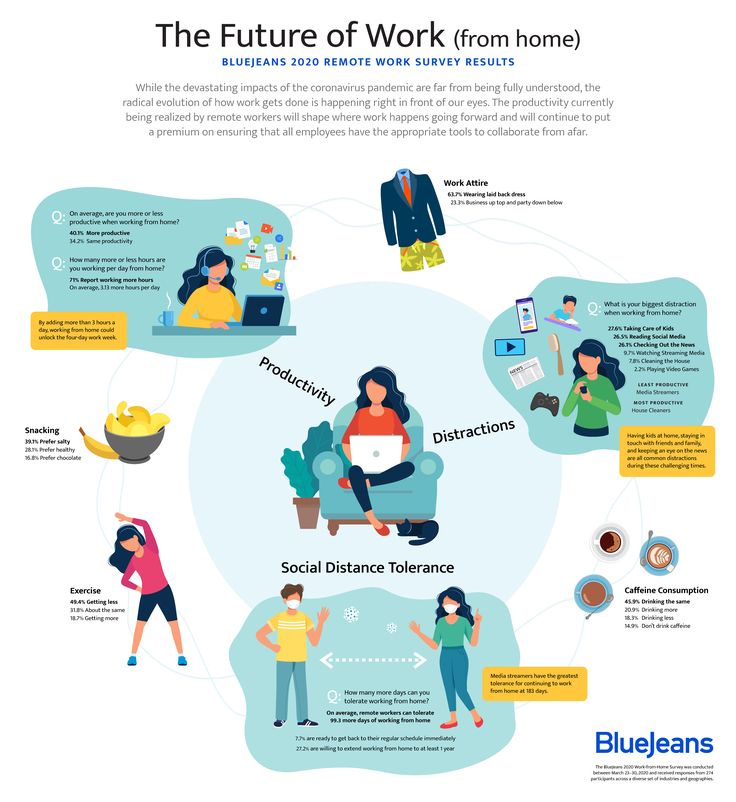
If you are exhausted and can barely think, it doesn’t matter how many hours are left in the day. You won’t be able to use them productively.
This is the logic of tackling difficult tasks early in the day — by using your peak hours efficiently, you can get more done in less time before you get tired. Jason Fried, founder and CEO of Basecamp, says that:
“While people often say there’s not enough time, remember that you’ll always have less attention than time.”
Highly productive people know that it isn’t enough to have time to do things. Managing your energy — to ensure that you tackle the most intense tasks while you have the energy to handle them — is an important trick to becoming productive.
18. Get better at saying “no”
Productivity tip – get better at saying no, even when it's uncomfortable Tweet this!
It’s so tempting to say yes.
New projects and opportunities crop up all the time. It’s easy to get excited by the possibilities — and then wind up with too many commitments.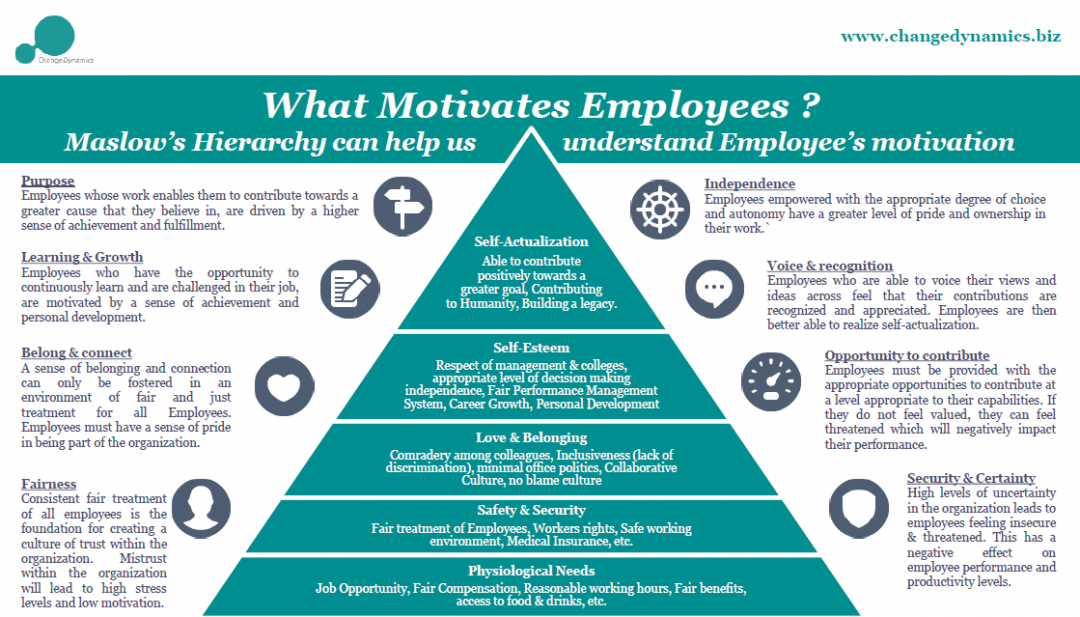
Saying no is hard. It means consciously setting things aside so that you have the time to work on your most important priorities. Expert Mark Shead from Productivity501 had this to say about the importance of saying no:
“People who are highly efficient are really good at NOT doing things.
Having less to do means that the time you spend on important things is more focused and more productive. Too often people think they are becoming more productive by filling up their day with more and more low-value work, but this low-value work takes away energy and creativity that could go toward high-value work.
The most productive and efficient people I know have figured out what they do that is really valuable and they put their effort into doing that to the best of their ability. Usually, this means that they stop doing some ‘good’ activities in order to focus on the things that are most important for them and for their goals.”
Conclusion: How to be more productive
Highly productive people can seem like magicians or robots.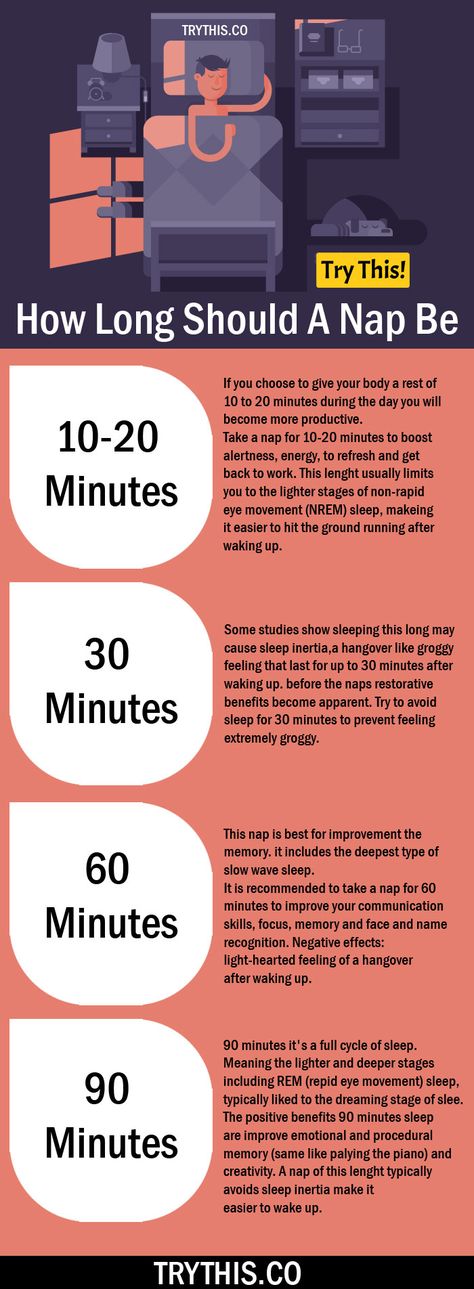 Most of the time, the most efficient people you meet have managed to find ways to overcome procrastination and other challenges.
Most of the time, the most efficient people you meet have managed to find ways to overcome procrastination and other challenges.
The most efficient people aren't necessarily brilliant – they've just found strategies to beat procrastination Tweet this!
Our productivity tips come down to 4 main things. Here’s how to be more productive:
- Manage your time well
- Make better to-do lists
- Take care of yourself
- Be proactive
And one more tip: Know when to ask for help.
Smart people ask for help. Productive people admit when they don’t know something. When you ask for help instead of trying to struggle through something on your own, you save time (and frustration). Make sure you know who and what your resources are — and make asking for help a habit.
To recap, here are the 18 work habits that highly productive people use to become more efficient:
- Focus on most important tasks (MITs) first
- Cultivate deep work
- Keep a distraction list
- Use the Eisenhower Matrix
- Use the 80/20 rule
- Break tasks into smaller pieces
- Take breaks
- Make fewer unimportant decisions
- Eliminate inefficient communication
- Find repeatable shortcuts
- Learn from successes as well as mistakes
- Plan for when things go wrong
- Work without getting motivated or inspired
- Don’t multitask
- Fill the tank and recharge
- Sharpen the axe and improve constantly
- Manage energy as well as time
- Get better at saying “no”
This post was originally published in January 2018.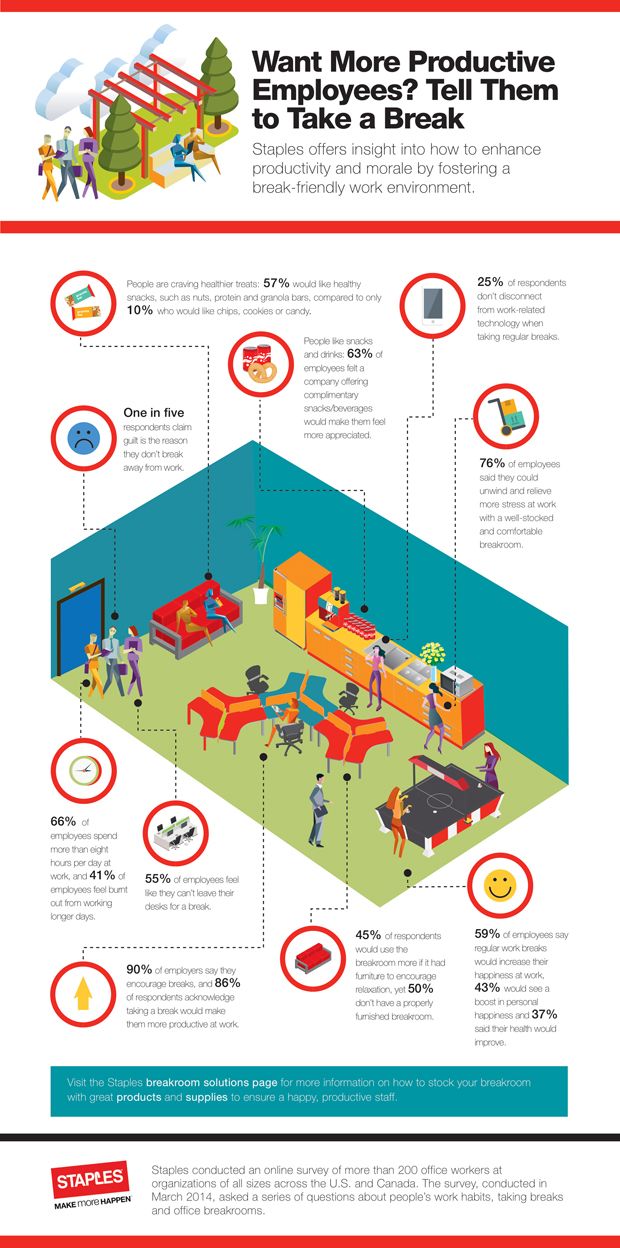 Updated April 2020.
Updated April 2020.
100 ways to become more productive - Offtop on vc.ru
A Life of Productivity blog author Chris Bailey has compiled a list of methods for effective time, energy and attention management.
35,359 views
After graduating from university, I got two great job offers, but turned them down because I had a plan. For a year, I was going to absorb all the information about productivity that came my way and write about it every day on my blog. nine0003
Over the course of the year, I have done countless experiments, interviewed many extremely productive people, and read many books and studies about productivity. To wrap up this year, I've compiled a list of the main things I've learned. These are my favorite ways to hack time, energy, and attention to get more done every day. The article is long, but it is easy to scroll to the right place.
Time management
How to manage time more efficiently
1. Set aside less time for important tasks. It seems illogical, but practice shows that it helps. When you limit the time you spend on important tasks, you force yourself to expend more energy in less time and get those things done on time.
Set aside less time for important tasks. It seems illogical, but practice shows that it helps. When you limit the time you spend on important tasks, you force yourself to expend more energy in less time and get those things done on time.
2. Forget TV. On average, a person spends 13.6 years of his life watching TV - they are better spent on more meaningful tasks.
3. Record your time in a diary. When you keep track of what exactly your time is spent on, you can see how much of it is being wasted, and this helps you recover wasted time and think about how to spend it better in general. nine0003
4. Give up activities that suck up your time, energy and attention. The best thing to do is to simply avoid unproductive activities in your life.
5. Remember that the best is the enemy of the good. Your house will never be in perfect cleanliness - something is bound to be wrong. Know when to stop, especially in unproductive activities.
6. Have a technical day.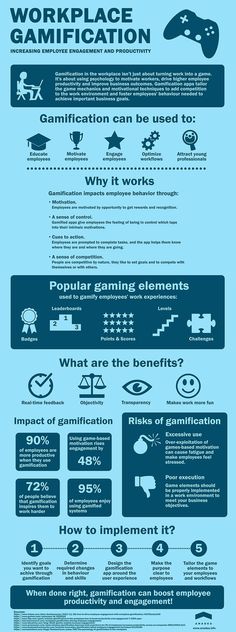 Group all such tasks (laundry, shopping, cleaning, watering flowers, etc.) on one day so that on the rest of the week you have more time for more promising tasks. nine0003
Group all such tasks (laundry, shopping, cleaning, watering flowers, etc.) on one day so that on the rest of the week you have more time for more promising tasks. nine0003
7. Do not work more than 35 hours per week. Research shows that under this condition, we reach the peak of productivity and creativity. Yes, working late makes you more productive—but only in the short term.
8. Your letters should not be longer than five sentences, and it is best to mention this in your signature. With this technique, I became insanely fast with mail, and most people are only happy when you write short and to the point.
9. Turn on The Email Game if you use Gmail. This is a free add-on that turns email responses into a game. nine0003
10. Register on Unroll.me if your mail is on Gmail, Yahoo or Outlook.com. This app collects all your subscriptions into one convenient daily email.
11. Stop putting letters into folders. Searching emails by keywords is much faster.
12.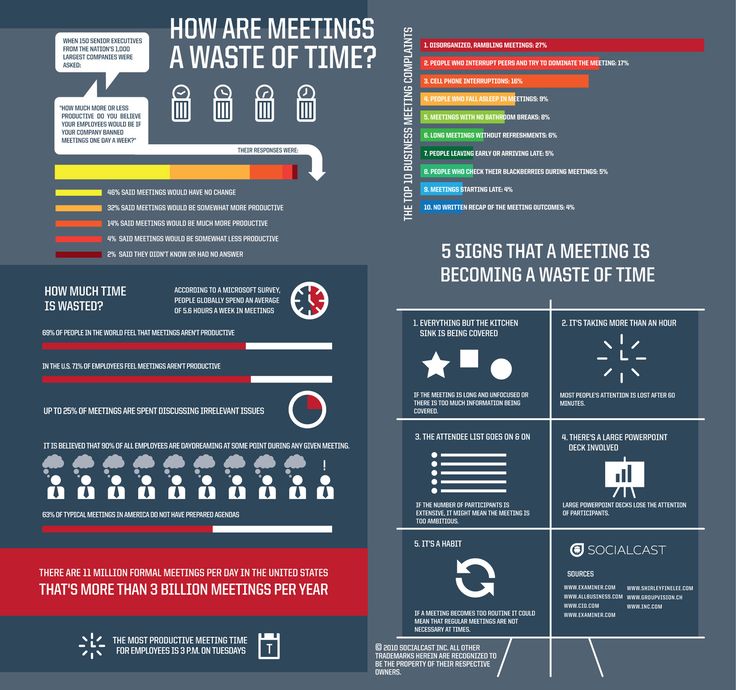 Learn to touch type. So you save a lot of time.
Learn to touch type. So you save a lot of time.
13. Track your computer time with the free RescueTime app. You will be surprised how much time is wasted. nine0003
14. The more of your income you save, the better. If you do not chase fashion and entertainment, you can reduce your working life by decades.
How to spend time doing the right things
15. Identify your most productive activities. Make a list of everything you are responsible for at work and ask yourself: if you could only do three of these things all day, which ones would you choose? It is in them that you need to invest 80-90% of your time. nine0003
16. Reduce the duration of your sessions so you don't feel resistance. This is a great way to learn new habits. “Can I meditate for 15 minutes? No, I feel resistance, I won't. Okay, what if 10? Still a lot. What if it's five? Hmm, that seems easy. I think I can do it." That's all.
17. Work on important but non-urgent tasks. Every day, do at least one important thing that does not have to be completed right today - this way you will move forward in achieving your long-term goals, and not just close current holes. nine0003
Every day, do at least one important thing that does not have to be completed right today - this way you will move forward in achieving your long-term goals, and not just close current holes. nine0003
18. Use the Pomodoro method: focus on something for 25 minutes, then rest for 5 minutes. It's incredibly efficient.
19. Make a procrastination list: productive and meaningful things to do the next time you procrastinate. This will help you stay productive even when your brain is trying to slip away from the things ahead.
20. Use the "two minute rule". This rule from David Allen's system says that when a task takes less than two minutes, just do it, and don't put it on the list for later. nine0003
21. Plan your free time. It seems like some kind of backward principle, but in general, structuring free time makes us happier and more motivated.
22. Determine the next thing you will do based on four questions: where you are (office, home, cottage, etc.), how much time you have, how much energy you have, and what are your most productive activities.
23. Watch how you spend your time. Constantly check and reflect on how you spend your time, as well as energy and attention during the day. For this, I put notifications on my phone that sound every hour. nine0003
24. Schedule a time when you are completely off work. At this time, the brain is still thinking about work issues, but in the background while you are busy with something else.
25. Spend more time planning. A minute of planning saves five minutes of implementation. If you only execute and don't plan anything, it's hard to work smarter.
26. Keep in mind what people really mean when they say they don't have time. Usually it's not that there is no time at all, but that the task does not seem important enough to them. nine0003
27. Take a break before sending important emails and messages. Give your brain time to form thoughts so your message can become more complete, valuable, and creative. The world will not collapse, and you will be able to convey your message more accurately.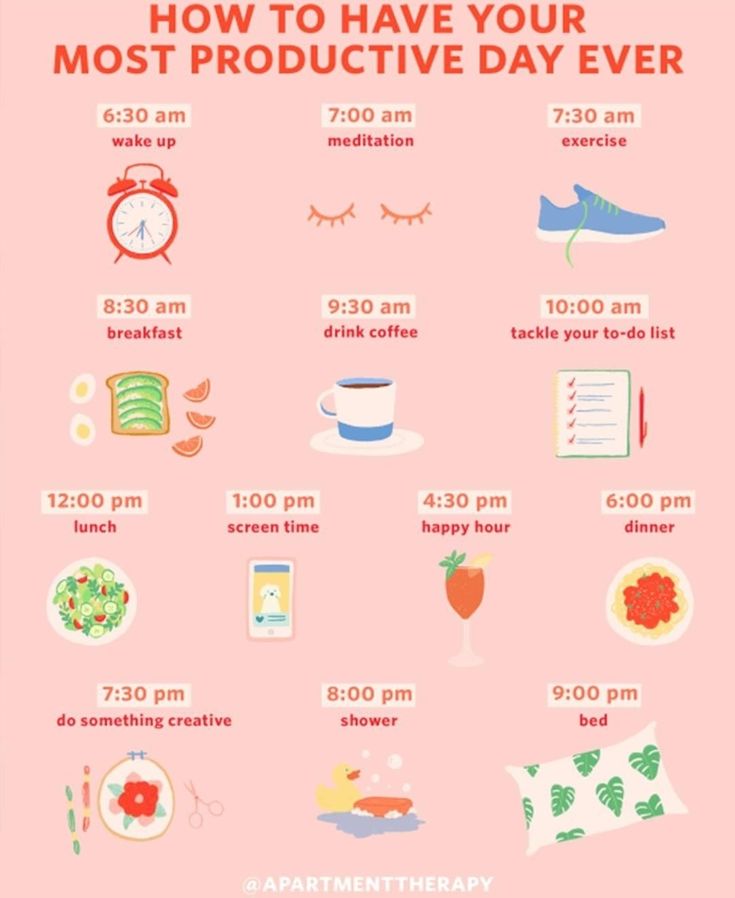
Energy Management
Body control techniques
28. Go in for sports. It's the best way to get more energy, plus it helps fight disease, lifts your spirits, and improves sleep. nine0003
29. Eat better. Your food greatly affects your energy levels. The worse you eat, the faster you get tired, and the less energy you have for current affairs.
30. Stop drinking coffee out of habit. Caffeine loses its effect when you drink it daily and in large quantities, but it is very effective if you use it strategically (only when you need an energy boost or need to focus).
31. Use caffeine wisely. Drink slowly, drink water at the same time, stay away from sugary energy drinks. When consuming caffeine, eat well, don't drink coffee on an empty stomach, and don't rush your second coffee or tea. nine0003
32. Do not drink caffeine less than four to six hours before bedtime. It reaches peak blood levels within an hour and is eliminated in four to six hours.
33. Drink more water. Water adds energy, speeds up metabolism, helps you think, suppresses your appetite, helps your body eliminate toxins, reduces the risk of many diseases, and even helps you save money.
34. Drink half a liter of water after waking up. Your body has just been without fluid for eight hours, and it is clearly dehydrated. nine0003
35. Keep a diary of what you eat. People who keep such a diary usually do not overeat - and eat on average almost a third less.
36. Get enough sleep, even more than you need. Sleep enhances concentration, attention, decision-making skills, creativity, social skills and overall health, and reduces mood swings, stress, anger and impulsivity. Between larks and owls, by the way, there is no difference in socioeconomic status.
37. Don't drink late at night. Alcohol before bed impairs the quality of sleep and reduces energy the next day. nine0003
38. Set the air conditioner to 21-22ºC. At this temperature, we are most productive.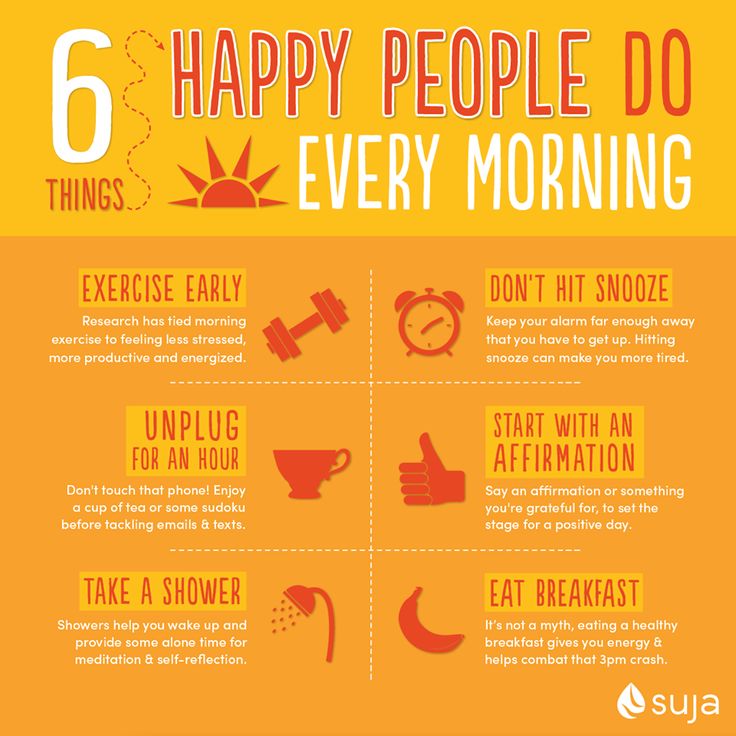
39. Set the air conditioner to 18.5ºC overnight. Most studies advise turning the bedroom into a cave at night, where it is cool, dark and quiet.
40. Learn to take a nap during the day. If your energy is waning during the day, take a nap. It strengthens memory, attention, restrains burnout and enhances creativity.
41. Constantly reflect on your energy level and act accordingly. So you can recharge your energy when it is low, and take on bigger, more daring things when there is more energy. Soon you will start noticing certain trends. nine0003
42. Find your biological peak by tracking your energy levels for a week.
43. Smile. It boosts immunity, helps you cope with stress and see the bigger picture, instills more confidence in people and is just nice.
44. Paint the office the right colors. Blue stimulates the mind, yellow stimulates the emotions, red stimulates the body, and green inspires a sense of balance.
45. Before going to bed, try to look less at the color in the blue part of the spectrum. Too much time on your phone, tablet or computer is bad for sleep. nine0003
Too much time on your phone, tablet or computer is bad for sleep. nine0003
46. Try to be in natural light. It helps to fall asleep, reduces stress, increases energy levels and focus.
47. Download F.lux - this program redshifts computer colors when the sun goes down, which encourages the body to produce more melatonin and improve sleep.
Brain control techniques
48. Constantly introduce new habits to change your life. This is how change is permanent. nine0003
49. Learn to reduce stress: exercise, read, listen to music, spend time with friends and family, get a massage, walk in nature, meditate, engage in creative hobbies.
50. Take frequent breaks. This stimulates the influx of new ideas, allows you to think about your work and become more productive in general.
51. Start small. To become more productive, you need to make very small changes one after another. The smaller they are, the more likely they are to happen. nine0003
52.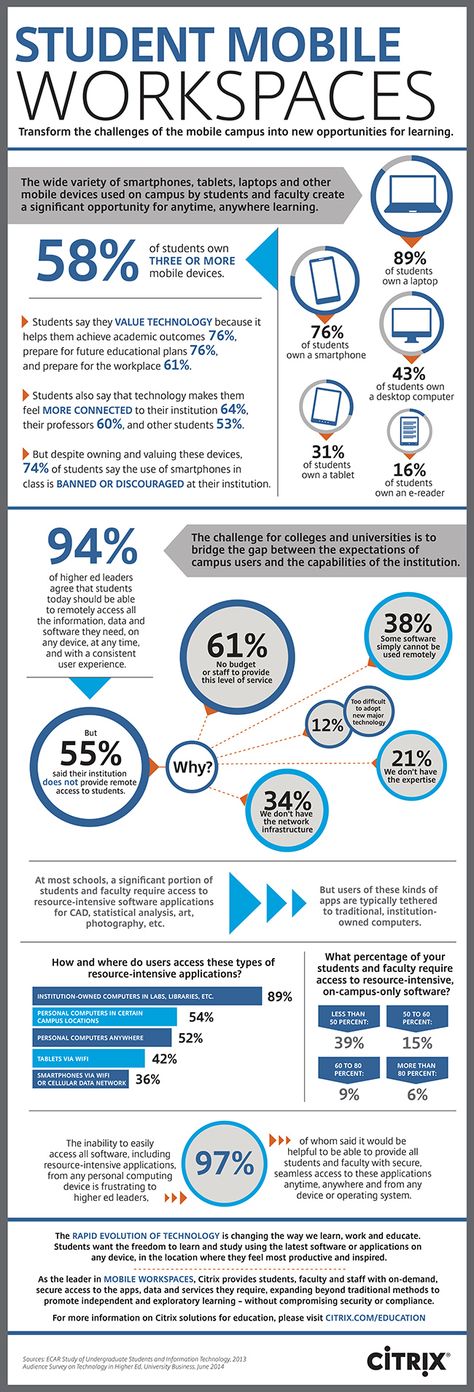 Notice when you are being too hard on yourself. According to coach David Allen, 80% of what we say to ourselves is negative. Track the moments when this negativity is overflowing to make life more pleasant.
Notice when you are being too hard on yourself. According to coach David Allen, 80% of what we say to ourselves is negative. Track the moments when this negativity is overflowing to make life more pleasant.
53. Be friends with your office colleagues. This increases job satisfaction by 50%, boosts job engagement by several times, and increases career chances by 40%.
54. Think about who you've been in contact with in the last few months. What meetings brought you the most energy, motivation, happiness and drive? Meet these people again. nine0003
55. Lower your expectations. Strange advice? But it makes you more confident, allows you to relax, have more fun and not worry about proving something to others.
56. Understand that nobody cares. When you realize that most people don't care about your success, money, clothes, house or car, you will realize that you are freer than you thought before. You can take more risks because your life is not cast in granite and follow what you consider your passion. nine0003
nine0003
57. Eat mindfully. Watch for when the brain begins to feel the approach of saturation - so you will not overeat, and this takes a lot of energy.
58. Visualize. My favorite example: Imagine that you have just received an order to leave town tomorrow for a whole month. What exactly do you need to do before leaving? Do it right now.
59. Don't run away from conflict, look for it. We are most productive when we experience moderate levels of conflict and stress. nine0003
60. Download the Coffitivity app. The ambient noise of a coffee shop has been proven to enhance productivity and creativity, while Coffitivity simulates this sound on a computer.
61. Every day remember three things for which you are grateful. This trains the brain to look for the positive in the world, not the negative, making you more energetic, happier and more efficient.
62. Write down a great experience every day. So the brain relives it again and energizes you.
63.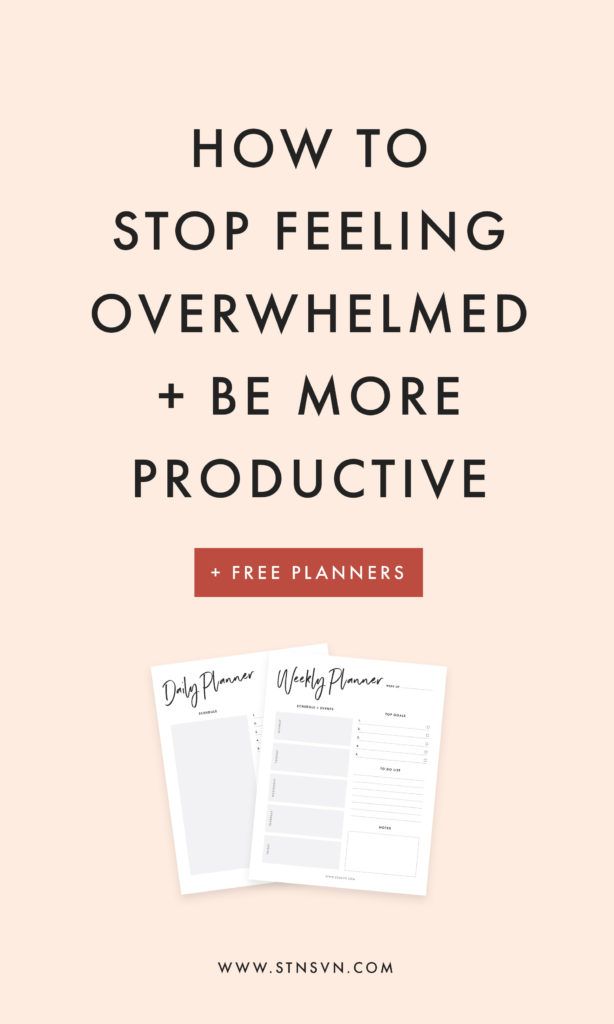 Exhale periodically. Don't take productivity too seriously. And most likely, by relaxing, you will become more productive.
Exhale periodically. Don't take productivity too seriously. And most likely, by relaxing, you will become more productive.
Attention management
How to become more attentive
64. Meditate. Meditation is the art of constantly returning attention to one object. It also calms the mind, increases blood flow to the brain, brings the feeling of “flow” closer, and helps fight procrastination.
65. Stop multitasking. It hurts performance terribly, increases the number of errors, badly affects memory and adds stress. nine0003
66. Record everything that's going through your mind - what you need to do, what you're waiting for, other ideas and commitments that weigh on you. This will give you more mental space to think about more important and enjoyable things.
67. Make a list of everything you expect so you don't miss anything and worry less about people and things to keep an eye on.
68. Start a ritual of fixing thoughts.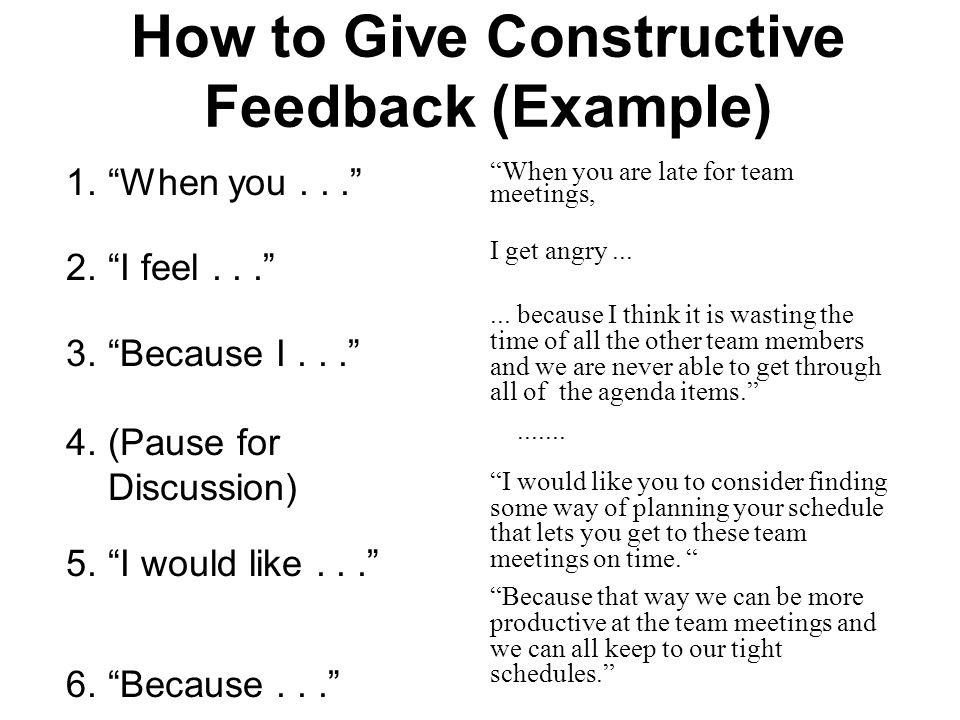 Unplug everything, set a timer for 15 minutes, and go to bed with a notepad and pen. Fix whatever is bothering you to clear those mental blockages. nine0003
Unplug everything, set a timer for 15 minutes, and go to bed with a notepad and pen. Fix whatever is bothering you to clear those mental blockages. nine0003
69. Eat something that strengthens concentration. My favorites: blueberries, green tea, avocado, lettuce and kale, oily fish, water, dark chocolate, flaxseeds, nuts.
70. Return to the starting point. When you finish something, clean up after yourself so it's easier to start next time. For example, after cooking, clean the kitchen or prepare sports equipment for tomorrow.
71. Learn to slow down. It's easy to turn on autopilot and jump from one distraction to another. Slow down and do things mindfully to manage your attention and be more productive. nine0003
72. When you need to do something, completely disconnect from the Internet. 47% of time spent online is spent procrastinating.
73. Resist temptation by practicing the reaction in your head beforehand. For example, imagine in advance how you will keep yourself from going to McDonald's on your way home.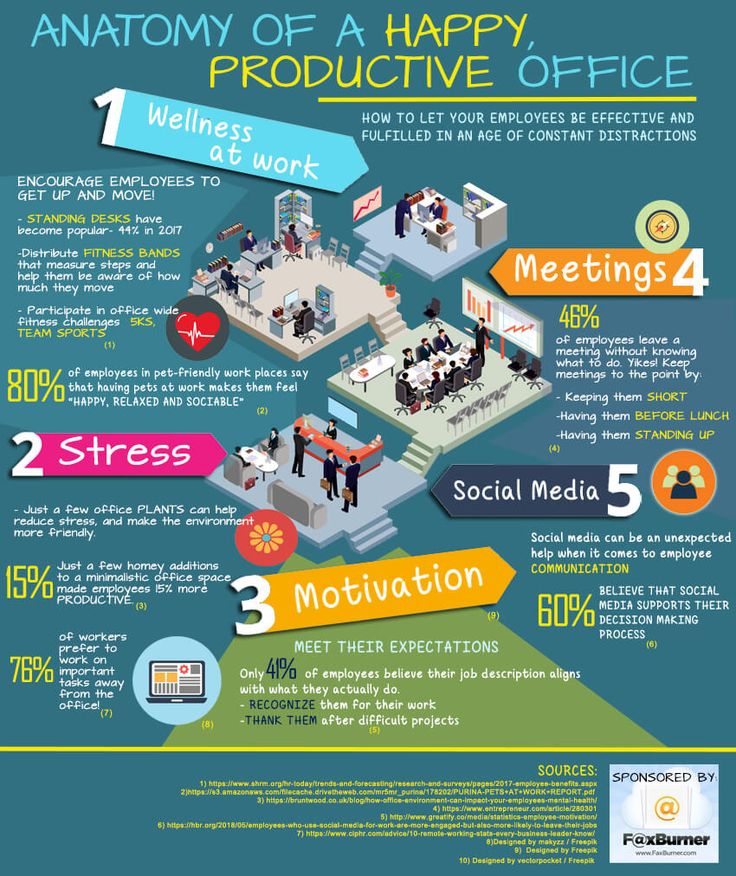
74. Use your smartphone less. It distracts you much more than it seems, it prevents you from communicating with people, and at the same time, immersion in it is an almost meaningless activity. I used my smartphone for only an hour a day for three months and since then it has not pulled me to itself. nine0003
75. Between 8pm and 8am, put your smartphone into airplane mode. This ritual helps you feel more meaningful, fall asleep faster, and encourages you to focus on better things before and after sleep.
76. Do things that are challenging enough for your skill level to work in a "flow" state.
77. Do less. When your attention, energy and time are divided among fewer things, you give more to each of them and achieve much more. nine0003
78. Look at pictures of baby animals. This enhances cognitive and motor outcomes because it narrows the focus of attention.
How to focus on what matters most
79. At the beginning of the day, identify three results that you want to achieve (namely, the result, not the action).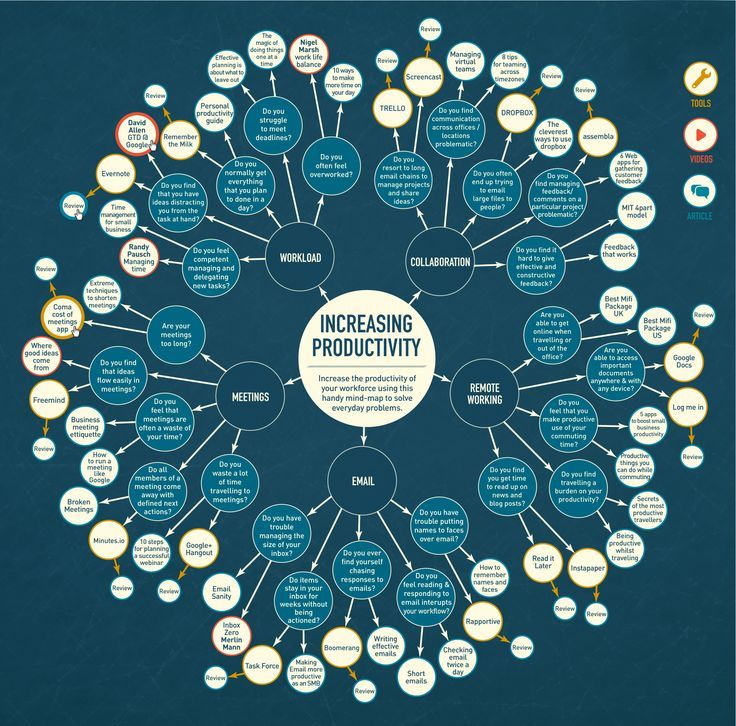 This will force you to prioritize.
This will force you to prioritize.
80. Focus not on doing more, but on doing the right thing. Find tasks that match your interests so that you understand why you want to implement them. nine0003
81. Develop a growth mindset. The main quality that distinguishes successful people from unsuccessful ones is that the former do not believe that their intelligence and skills are set once and for all.
82. Talk to your future self. People often perceive themselves now and themselves in the future as completely different people. Create a memory of the future, send a message to yourself in the future, or just imagine what kind of person you will become.
83. Make a list of mindless things. Gather together tasks like laundry or cleaning and do them in a row while listening to something meaningful (an audiobook, a TED talk, etc.). nine0003
84. Ask yourself for advice.
85. Make your goals smarter: specific, measurable, realistic and time bound. This will make them easier to identify and achieve.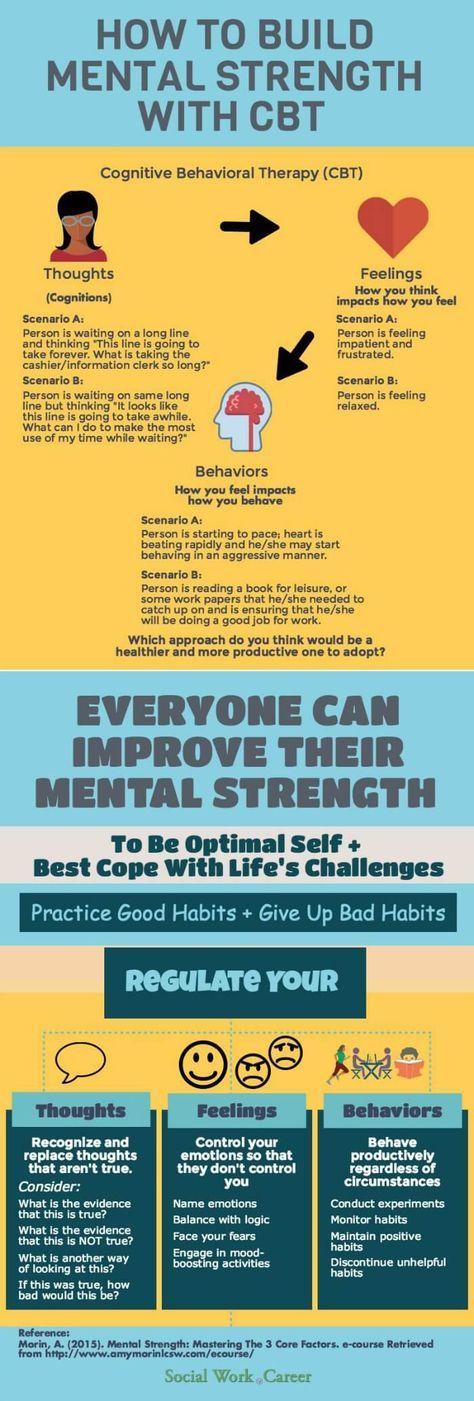
86. Stop tracking the process of moving towards the goal. This usually reduces the chances of reaching them. How to be? See your actions as evidence that you are committed to this goal and remind yourself why you are striving for it in the first place.
87. Set intermediate goals, not traditional ones. Intermediate goals are goals that you need to achieve on the way to a larger goal: for example, do not set a goal to win a boxing championship, but set a goal not to be knocked out once during the match. nine0003
88. Stop surfing the Internet aimlessly. Better just relax, slow down and think about what you really need to achieve.
89. Turn off useless email notifications. They take a little time, but a lot of attention - every time you get a notification, it takes attention away from the case.
90. Have an email vacation. When you need to sit on a project for a day or two and work hard on it, put an auto-responder in your mail and calmly get on with your current business.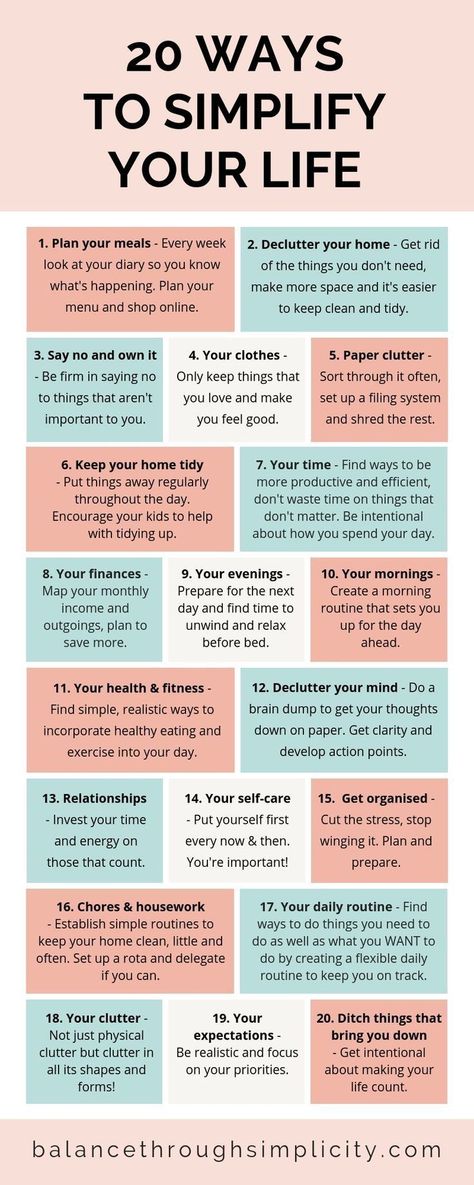 nine0003
nine0003
91. Answer emails in waves. Set a few times a day to reply to emails rather than replying to them as they arrive.
92. When you have a personal meeting with someone, turn off your phone completely. You will show that you are ready to give the person 100% of your attention.
93. Identify your core habits. These are habits that change and build other habits in your life. A few examples: cooking, developing relationships with a partner or friends, waking up early. nine0003
94. Make bad habits costly: arrange with someone to pay each other fines when you indulge in bad habits. This way you will think about the cost of habits, and not about the pleasure of them.
95. Reward yourself. New habits and behaviors are hard, but if you reward yourself in some way for them, it helps to make them established.
96. Anticipate what will hinder the development of new habits.
97. Keep distractions at least 20 seconds away from you. This is enough distance to reduce their strength.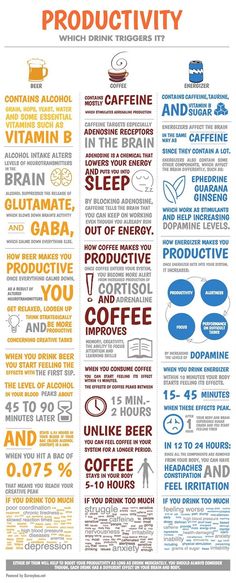 nine0003
nine0003
98. Listen actively. Focus fully on the words of the person you are talking to - this creates a deeper relationship, helps you judge people better, avoid misunderstandings.
99. View life as a series of hotspots. Every day your time, energy and attention is spent in seven areas: brain, body, emotions, career, finances, relationships and pleasure. Think of these hotspots as portfolio investments - be careful not to invest too much in some and too little in others. nine0003
100. Always act with a specific goal in mind. When you constantly ask yourself why you are doing this, your actions will be tied to a goal that actually makes sense.
Related Articles:
- Research: What Your Daily Habits Can Reveal About You.
- Don't feel like working? 10 simple ways to concentrate.
- 12 signs that it's time for you to go on vacation.
Stories
Stories
Daria Sidorova
Editor of the History Department.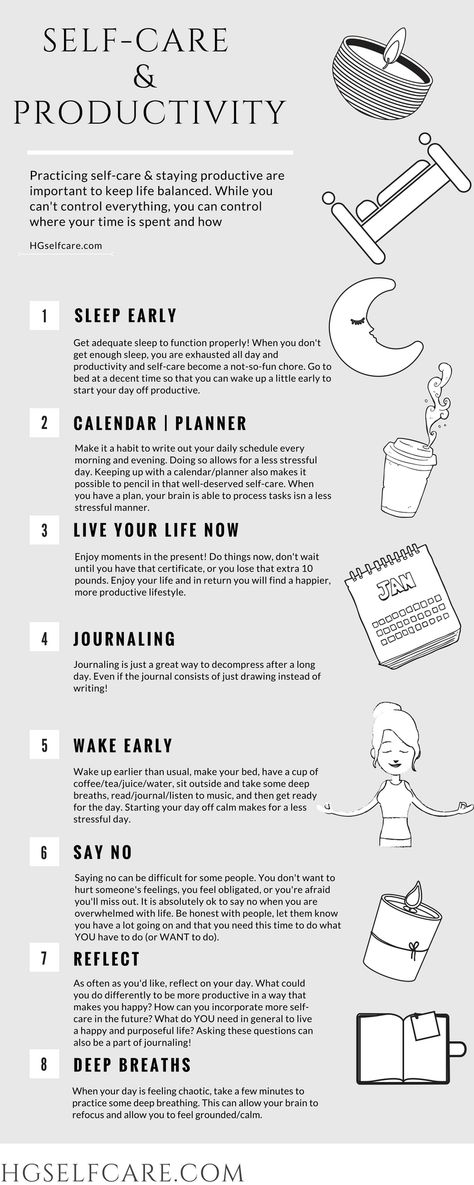
Darya Sidorova
Wrong thoughts and habits take away strength, but we don't always notice it. Unnecessary meetings and conversations, lack of rest, unnecessary resentment - all this leads to a loss of energy. Here are ten practical tips to help you become more productive. nine0003
Daria Sidorova
Learn to say no.
Learn to say no when a request or meeting is not worth the time. Think about it: will you remember this event many years from now? If not, then it probably doesn't matter. And don't feel guilty for the rejection: you're saving time for higher priority tasks.
Rest regularly
Overwork does not mean high productivity. Tired and irritated people work worse. Rest helps to reset the brain and put thoughts in order. Moreover, the presence of free time will allow you to engage in hobbies and communicate more with friends and family.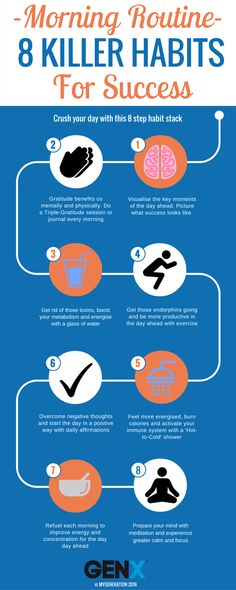
Set deadlines
Deadlines help you work more efficiently and achieve results. The need to meet deadlines significantly speeds up the process of work and helps to stop procrastinating everything for later.
Move more
Physical activity makes you feel better and improves your mood. Try to combine it with your usual activities: for example, during a conversation, you can walk around the room, and while watching a series, do exercises.
Focus on the process, not the result
It is much more useful to focus on the process than on the result. Learn to enjoy the process. Moreover, developing a strategy for solving a problem will help you organize your work and get it done faster. nine0003
Enjoy the little things
It is important to find pleasure in simple moments. Grandiose events that determine fate occur very rarely. However, small events that happen every day end up changing our lives.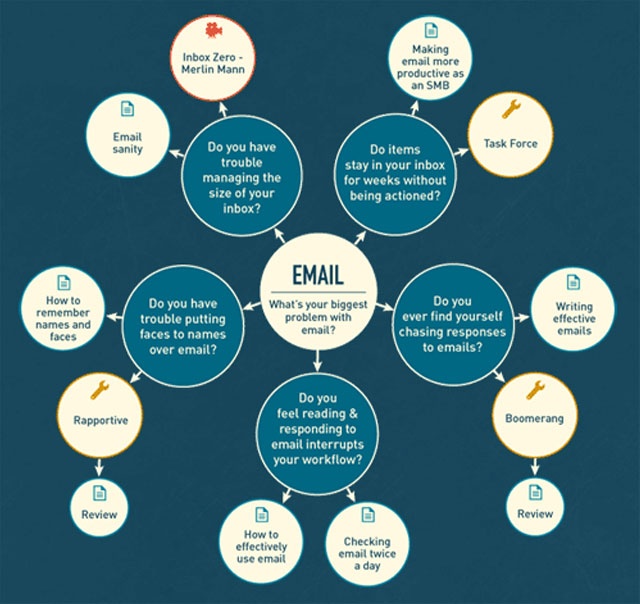
Make Fewer Decisions
The decisions you make take away the energy you need to stay productive. You can systematize tasks and make a plan for the day in advance so as not to waste extra time and effort.
Don't rely on luck
Do not hope that by a strange coincidence you will be able to complete all the cases. Most likely, you will not have time to realize all your plans for the weekend. As well as during the holidays. Because it's not about luck - only daily tasks will help you achieve success.
Focus on one goal
If you feel like all your aspirations are getting nowhere, try reducing the number of goals. Many successful people are focused on one thing, although it seems that they achieve results in different areas. Don't try to do everything to impress others - work on one specific goal. nine0003
Let go of resentment
Anger and resentment take a lot of time and effort, switching attention from important goals to meaningless ones.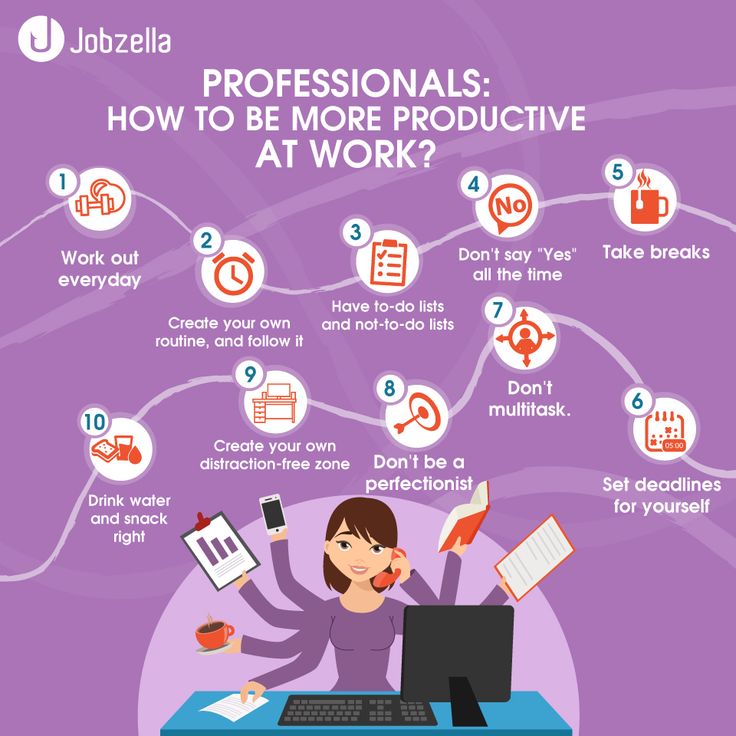 By letting go of bad emotions, you can become much more productive. You can't be angry and productive at the same time. Get rid of the extra drama in your life and instead focus on more important things.
By letting go of bad emotions, you can become much more productive. You can't be angry and productive at the same time. Get rid of the extra drama in your life and instead focus on more important things.
Source.
Cover photo: KaliAntye / Shutterstock
- life hacks nine0249 Lifestyle
Found a typo? Select the text and press Ctrl + Enter
Related materials
- one How to be more productive with breaks
- 2 The self-employed in Russia appreciate the free schedule and the absence of bosses in their work.
